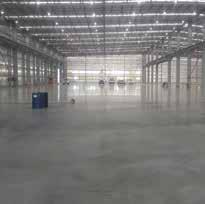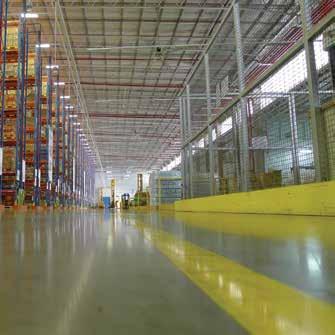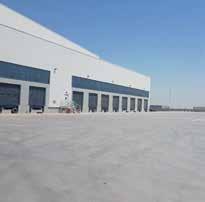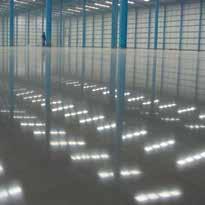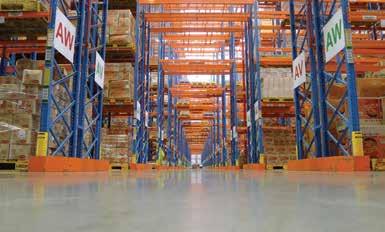Pieter Feenstra CEO, Addverb


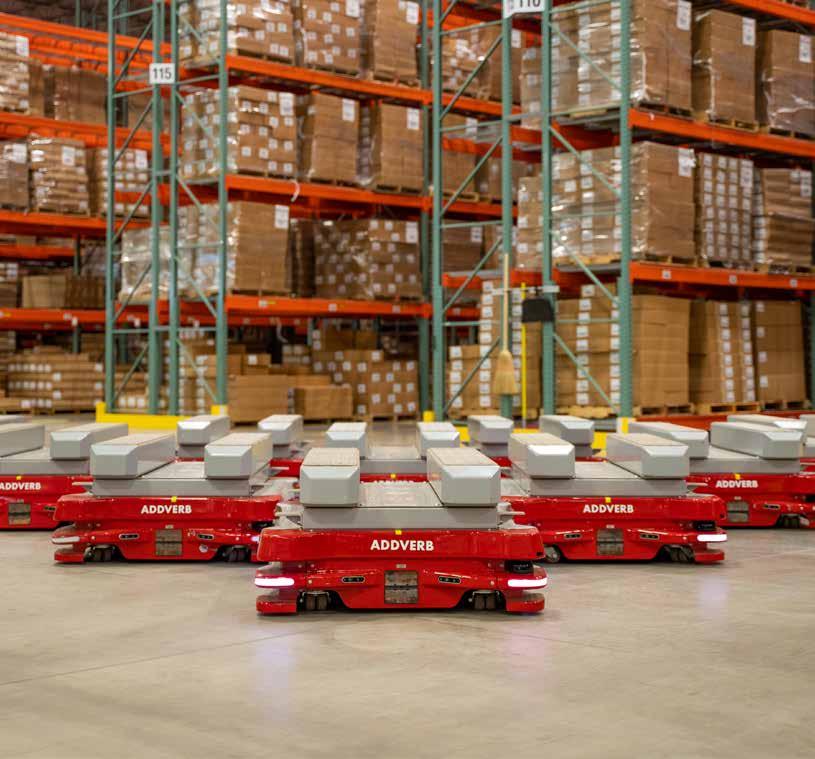


Pieter Feenstra CEO, Addverb




Full offering
- Full range vehicles with the most advanced technologies
- Highly customized product driven by market needs and optimized Total Cost of Ownership
High capillarity of aftersales
- Repair and Maintenance contracts and competitive warranty conditions
- Origin 100% IVECO Parts and a widespread network coverage
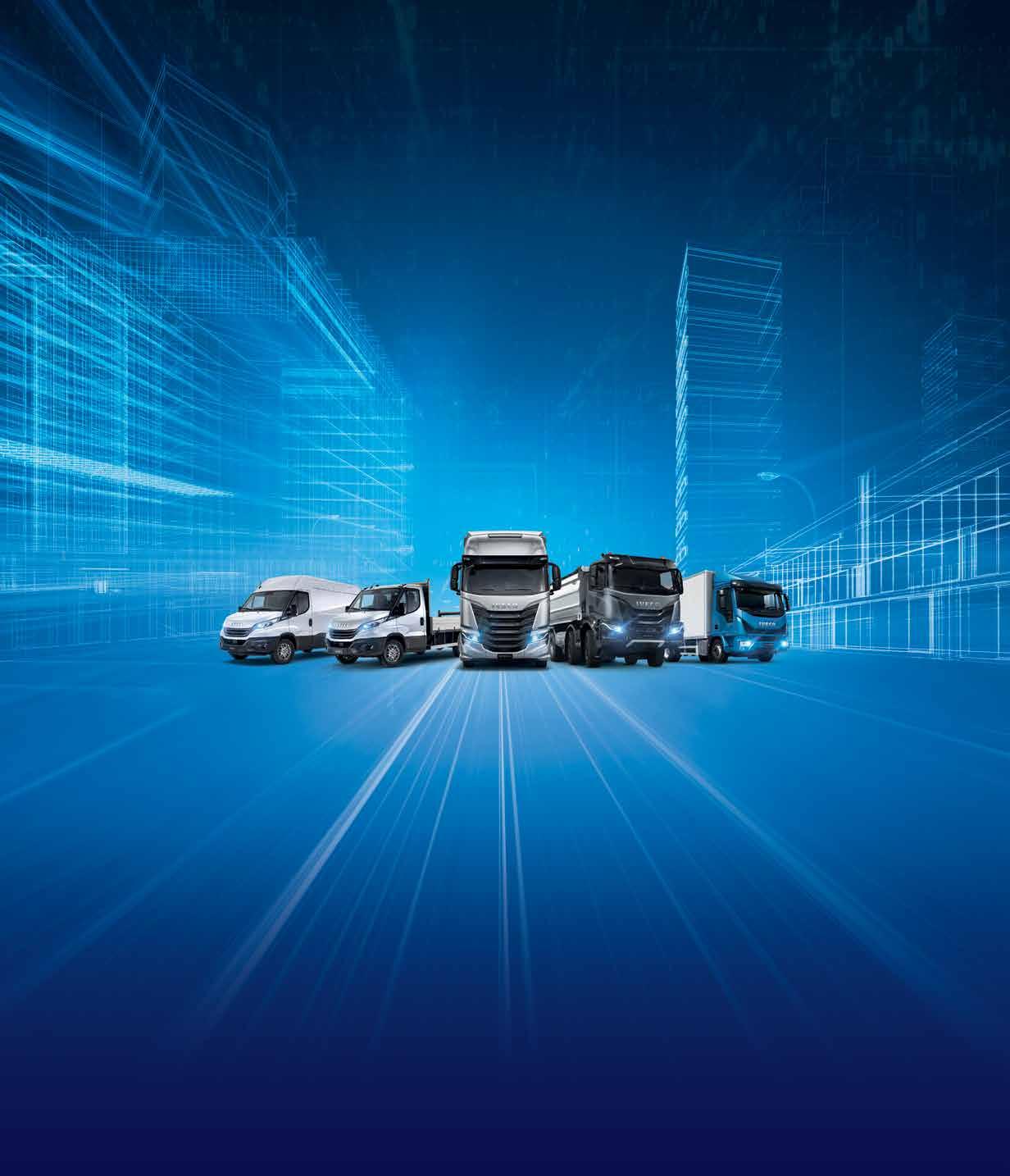
European technology
- High quality complete line-up in terms of tonnage, power, torque, safety, ergonomics
- High performance and robust trucks for extreme Off-road conditions
Customer centricity
- Comfort, ergonomics and the latest safety technology to make on board easier
- Driver Style Evaluation tool on Heavy ON-road range and optimized vehicle design to improve customer profitability















SIGNATURE MEDIA FZ LLE
P. O. Box 49784, Dubai, UAE
Tel: 04 3795678
Email: info@signaturemediame.com
Exclusive Sales Agent Signature Media LLC
P.O. Box 49784, Dubai, UAE
Publisher: Jason Verhoven jason@signaturemediame.com
Editor: Abigail Mathias abigail@signaturemediame.com
Art Director: Johnson Machado johnson@signaturemediame.com

Printed and Distributed by Masar Printing and Publishing L.L.C., Part of Dubai Media Incorporated Dubai, UAE
Contributor’s opinions do not necessarily reflect those of the publisher or editor and while every precaution has been taken to ensure that the information contained in this magazine is accurate and timely, no liability is accepted by them for errors or omissions, however caused. Articles and information contained in this publication are the copyright of Signature Media FZ LLE & SIGNATURE MEDIA LLC and cannot be reproduced in any form without written permission.
Sustainability isn’t just a catch phrase; it is a way of life. The team at Global Supply Chain ensured we took this pertinent discussion to a public platform. An international event hosted by CTW and MIE Events was held at Atlantis, Dubai and I moderated a panel on Sustainability with Purpose. It was a truly learning experience as stalwarts of the community discussed using technology to ensure that the best practices are set in place for now and the future.
Smart, scalable, self-driven, that is Addverb’s blueprint for robotic logistics, our exciting cover feature for the month. Abdul Jebbar, Founder, Group CEO and Managing Director, Hotpack discusses ethical sourcing in the demanding food packaging industry.
We bring you insights from FedEx and Orbis which navigates the skies to reach remote corners of the globe to restore sight. It has been doing this relentlessly for the past 40 years.
We encounter powerful entrepreneurs like Marium Dahar, Founder & CEO of Bricks Executive Search and Angela Pernsteiner, driving force and visionary founder of WÜRTH Professional Solutions (WPS) and Executive Board Advisor to the WÜRTH Group. With vision and passion they each represent the best of this industry.
We bring you the latest details of a new Supply Chain Professional Club launched in the UAE.
We will be on the ground covering the TIACA Air Cargo Forum from the capital which coincides with ADIPEC.
This month also has a guest column from a moderator at Global Rail. Having a safer, faster option to travel between countries and cities sounds like a win-win for the planet.
As we wrap our arms around the cooler weather, lets ensure we do more to harness the power of Mother Nature.
Happy reading.
Abigail Mathias Editor
abigail@signaturemediame.com www.globalsupplychainme.com
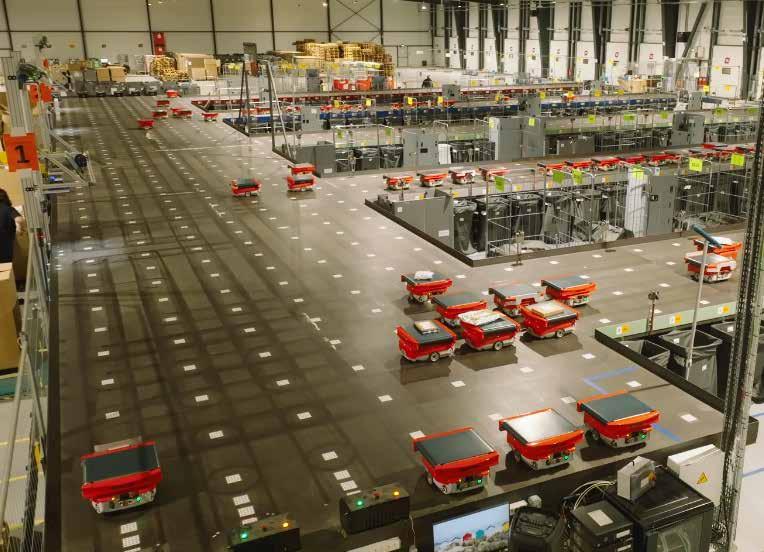
1500+
150+
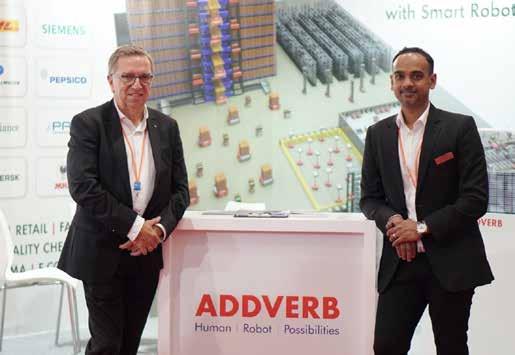
Addverb is a global robotics and automation company revolutionising warehouse and supply chain operations through advanced AI and robotics. Founded in 2016 and headquartered in Noida, India, it offers end-to-end solutions for material handling, storage, and intra-logistics. With a presence across five continents, Addverb serves major clients like PepsiCo, Johnson & Johnson, and Hindustan Unilever. Its portfolio includes autonomous mobile robots, automated storage systems, and AI-powered software for scalable, flexible logistics. This month’s cover story has special inputs from Ankur Yadav, VP, Sales & Strategy and Pieter Feenstra, CEO, Addverb EMEA.
GSC: What differentiates Addverb’s robotics and automation solutions from competitors?
Ankur Yadav: What truly sets Addverb apart is the breadth, intelligence, and reliability of our automation ecosystem. Our wide product portfolio offers both end-to-end automation and modular point solutions, capable of handling a diverse range of form factors, from individual pieces to totes, crates, bags, and pallets, enabling seamless picking, storage, and movement of goods. We combine fixed and flexible solutions powered by a single layer of AI-enabled, in-house software that not only orchestrates the entire operational flow but also integrates effortlessly with external ERP and warehouse management systems. This is complemented by robust after-sales support, including trained on-site engineers, dedicated hotline assistance, and a comprehensive service platform, ensuring a smooth, reliable, and future-ready customer experience.
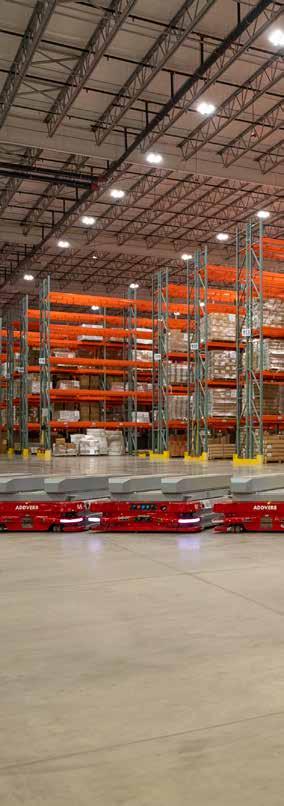
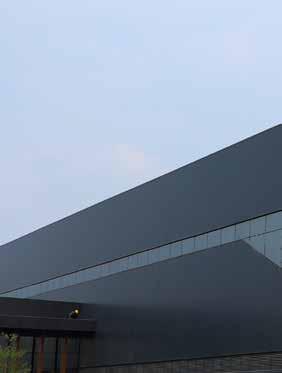
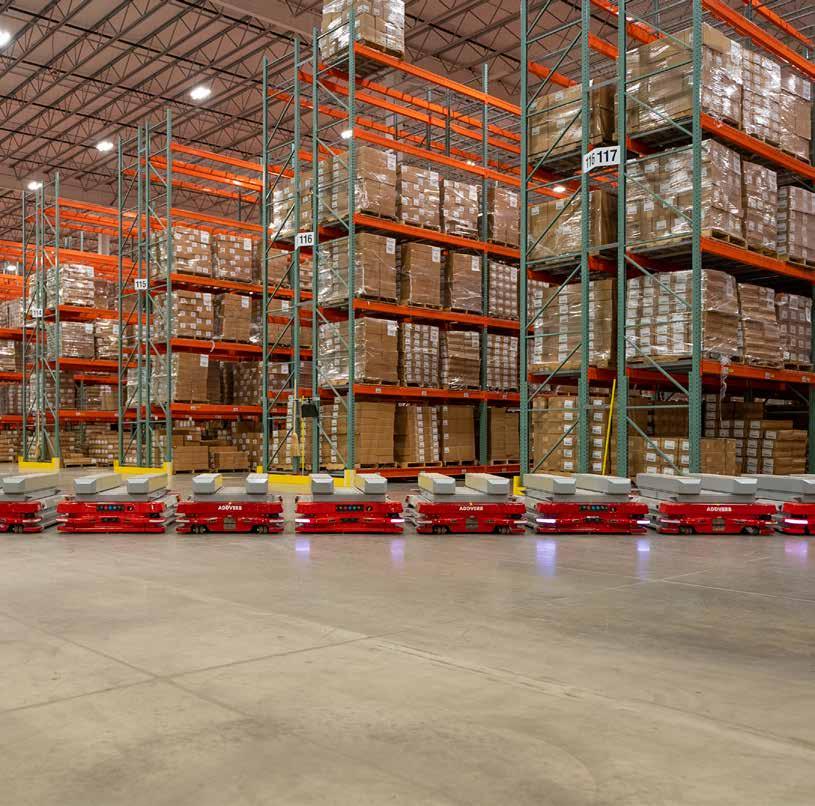
We combine fixed and flexible solutions powered by a single layer of AI-enabled, in-house software that not only orchestrates the entire operational flow but also integrates
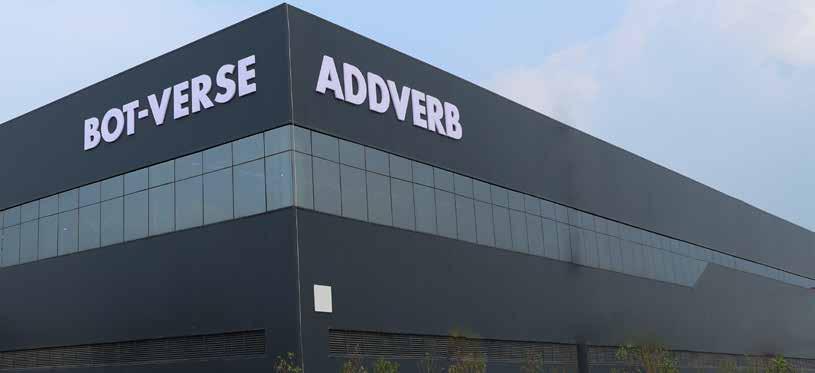
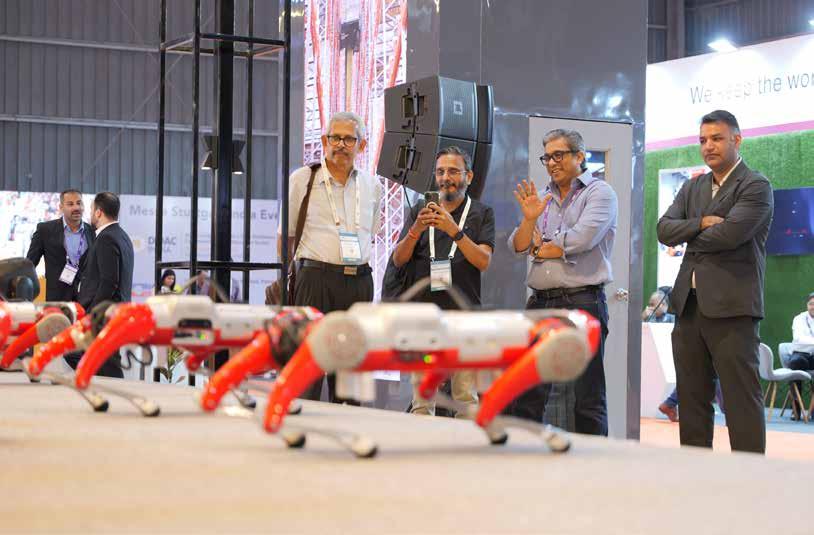
GSC: What motivated Addverb to expand into the UK and Ireland at this time and how does this move fit into Addverb’s broader global strategy?
Pieter Feenstra: Expanding into the UK and Ireland marks a strategic and natural progression in Addverb’s European growth journey. As one of the largest and most advanced markets for warehouse automation, the region offers immense potential for direct business engagement, particularly across Northern Europe. This move aligns seamlessly with our broader global strategy to strengthen our presence in key international markets through localised operations and customer proximity. Moreover, operating in English-speaking regions allows for smoother integration with our global
organisation, which is managed entirely in English, enabling efficient collaboration and support. The addition of a highly experienced local team in the UK has further accelerated our ability to establish a strong foundation and deliver immediate value to customers in this new market.
GSC: What unique challenges or opportunities do you foresee in the UK and Ireland logistics market?
Pieter Feenstra: Personally, I know that market quite well, as I was living there for several years, also doing business in the warehouse automation market. The market is big and many customers are automation minded, so that helps. At the same time, almost all international players have a presence there, so that is the
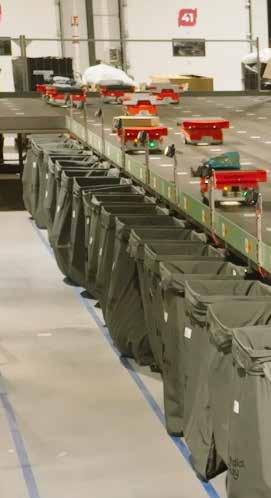
challenge. Addverb will be focussing on some solutions where we have competitive and innovative solutions. For now, the key opportunities seem to be in the pallet handling area, both in storage (with our 4-way pallet shuttle solutions), as well as in transports and picking. Another promising area is in robotics sortation. I am quite sure we will see our first orders in the next 3 months in the UK!
GSC: How does AI play a role in your warehouse orchestration and logistics systems?
AY: AI lies at the core of all Addverb products and solutions, driving intelligence, adaptability, and efficiency across warehouse orchestration and logistics systems. Our software stack integrates AI agents that operate on complex business
models to make processes smarter and more autonomous. In our Warehouse Management System (WMS), AI-powered prediction and optimisation models enable demand forecasting, inventory and stocklevel management, intelligent slotting, and SKU affinity optimisation. Within our Fleet Management System (FMS), vision and perception-based AI models empower AMRs and cobots with real-time decisionmaking and spatial awareness for seamless navigation and task execution. Furthermore, AI enables predictive and augmented reality-based maintenance in our after-sales and training modules, ensuring proactive support and enhanced operational reliability. Together, these capabilities allow Addverb to deliver intelligent, data-driven automation that continuously learns, adapts, and improves warehouse performance.
AI enables predictive and augmented reality-based maintenance in our after-sales and training modules, ensuring proactive support and enhanced operational reliability.
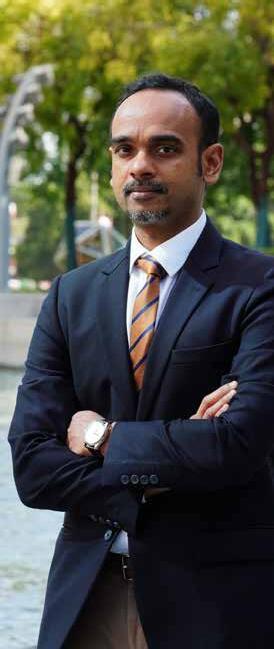
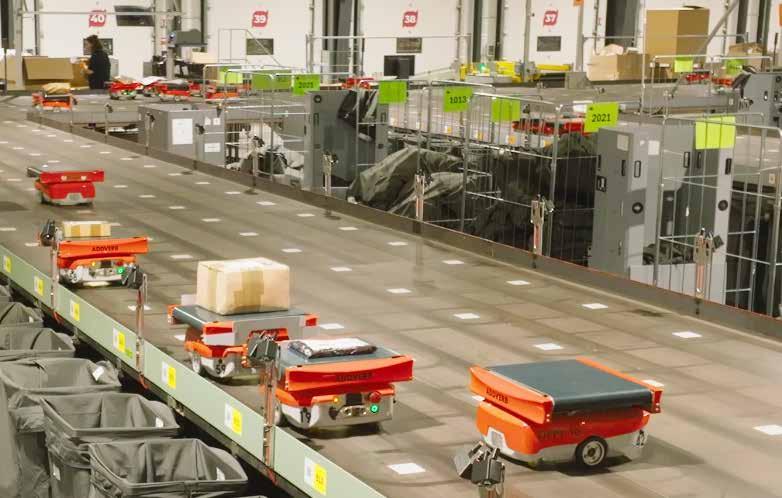
Addverb has forayed into advanced robotics with the launch of Cobots, Quadrupeds, and Humanoids. These next-generation robots rely on multi-modal data inputs, vision, audio, and touch, to navigate complex environments, perform intricate tasks, and make intelligent, realtime decisions
Branch Manager Ian Stevens and Project Manager Matt Pedley, Netherlands with Pieter Feenstra, CEO, Addverb EMEA.
GSC: Can you share examples of how your technology has transformed operations for clients?
AY: Addverb’s technologies have consistently transformed operations for clients across industries by enhancing efficiency, accuracy, and scalability. For instance, we deployed sortation robots for the Landmark Group, revolutionising their order sorting process and significantly improving throughput, order accuracy, and space utilisation while reducing manual dependency.
Our 4-Way Pallet Shuttle, a dense, flexible, and modular storage and retrieval solution, has optimised warehouse operations for a leading FMCG company by maximising storage density, improving inventory traceability, and enabling faster pallet movement across multiple aisles and levels. Additionally, our conveyor and sortation systems have powered seamless order fulfilment for large e-commerce and 3PL companies, streamlining material flow and reducing turnaround time even during peak operational loads. These implementations reflect how Addverb’s intelligent automation portfolio enables businesses to achieve higher productivity and operational resilience through tailor-made, scalable solutions.
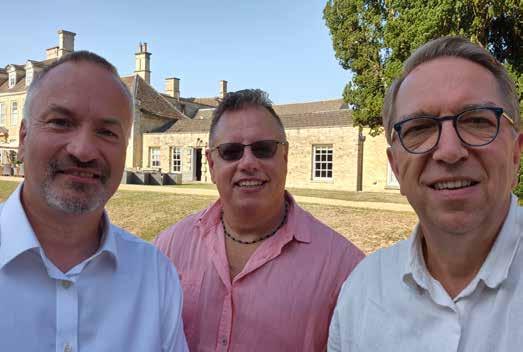
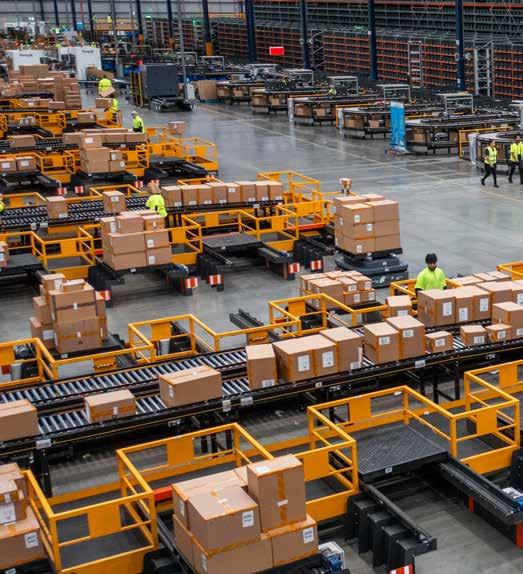
GSC: How does Addverb incorporate sustainability into its logistics solutions?
PF: At Addverb, sustainability is embedded into every layer of our logistics and automation ecosystem. We engineer our robots and systems for energy efficiency, conduct cradle-to-gate life cycle assessments, and power our facilities like Bot-Verse through renewable sources, which now meet 13% of our energy needs. Our operations emphasise responsible waste and e-waste management under Extended Producer Responsibility norms, alongside a strong focus on ethical sourcing, local procurement, workforce well-being, and community engagement. Our internal commitment to achieve Net Zero by 2050 reflects our belief that true innovation is sustainable innovation, creating intelligent automation that powers progress while protecting the planet.
GSC: How is Addverb preparing for the next wave of AI and robotics innovation?
AY: Apart from its technological leadership in the intralogistics space, Addverb has forayed into advanced robotics with the launch of Cobots, Quadrupeds, and Humanoids, expanding into new domains such as medical, defence, surveillance, and core manufacturing. These nextgeneration robots rely on multi-modal data inputs, vision, audio, and touch, to navigate complex environments, perform intricate tasks, and make intelligent, realtime decisions. To prepare for this next wave of robotics, Addverb is continuously advancing its capabilities in AI, machine learning, sensor fusion, and edge computing, ensuring these systems become increasingly adaptive, perceptive, and capable of working safely alongside humans in dynamic, real-world scenarios.
GSC: The company is known for blending software intelligence with robust hardware to deliver smart, safe, and sustainable logistics solutions. Can you elaborate more on this?
PF: Addverb has a unique positioning, with a hardware portfolio that combines conventional fixed automation products like conveyors and stacker cranes with flexible automation solutions such as AMRs and sortation robots. This is complemented by a modern software stack that enables us to create holistic, intelligent automation ecosystems. We can deliver softwareonly solutions, focused product-based systems like robotic sortation, or complete integrated automation setups. Our broad range of capabilities allows us to compete across diverse market segments and design solutions that truly fit each customer’s operational needs, rather than tailoring them to a specific product.
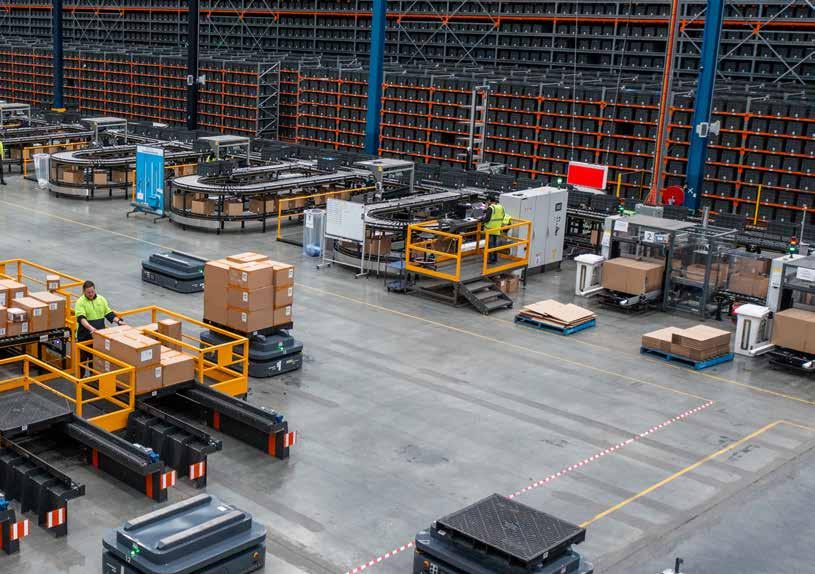
Gulf Warehousing Company Q.P.S.C (GWC), one of the leading logistics providers in the MENA region, has acquired a strategic, noncontrolling stake in European technology and logistics scale-up Quivo. The move expands GWC’s footprint across three continents and will enable homegrown Qatari and GCC brands to gain fast access into major European and US marketplaces. It also provides access to millions of GCC consumers for leading international companies, powering growth across the region.
Sheikh Abdulla Bin Fahad Bin Jassim Bin
Jaber Al Thani, Group Managing Director, GWC, said: “This strategic acquisition strengthens GWC’s global presence and connects Qatar’s logistics expertise with new markets. It gives homegrown regional brands seamless access to international marketplaces and access point global companies to reach hundreds of millions of consumers across the region.”
In addition to its robust technology backbone and e-commerce expertise, Quivo boasts a network of six warehouses in Germany, France, Austria, UK, and USA. Its scalable infrastructure supports international brands in their growth, including a modern
‘GWC’s
global presence now spans 3 continents, carrying Qatar’s logistics expertise into new markets’
– Sheikh Abdulla Bin Fahad
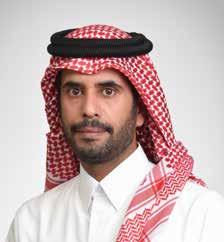
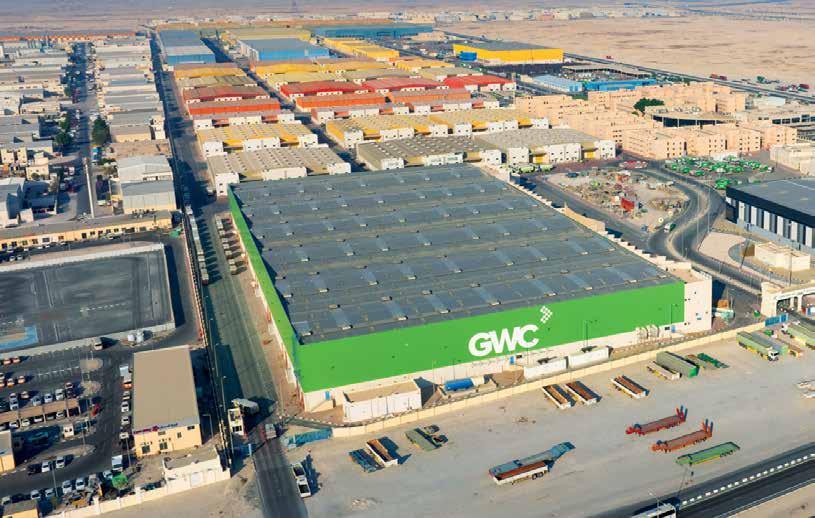
‘The strategic stake acquisition of Quivo strengthens our position as a leader in tech-enabled e-commerce logistics’
– Mathew Kearns, GWC’s Acting Group CEO
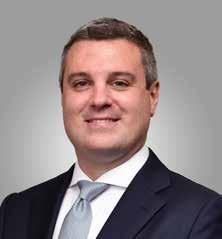
warehouse management system, multichannel listing, API integrations, and easy marketplace integration with global platforms like Amazon and Shopify.
GWC has already integrated Quivo’s software into its warehouses in Qatar, with additional rollouts planned in the UAE and Saudi Arabia in the coming months. The two brands aim to capitalise on the GCC’s booming e-commerce market, projected to nearly double to US$ 47 billion by 2029, according to the Seamless GCC Market Report 2024.
While the acquisition expands GWC’s portfolio and gains access to European and US markets, Quivo gains access to a prime growth market in the GCC. Customers of both companies will benefit from being able to seamlessly scale their products between the MENA region, Europe, and the US.
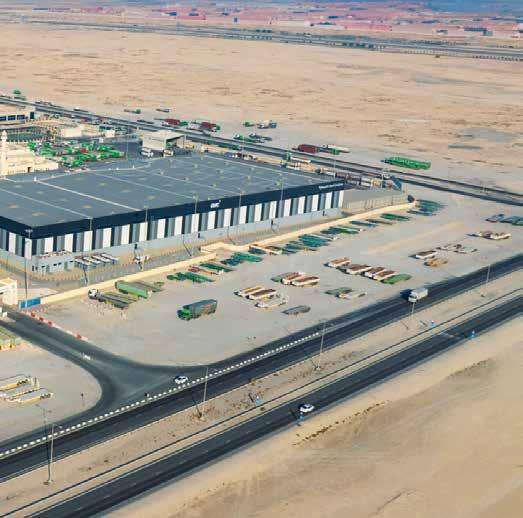

Georg Weiß, Co-Founder and CEO, Quivo
Matthew Kearns, GWC’s Acting Group CEO, stated: “We are advancing how logistics and technology work together. The strategic stake acquisition of Quivo extends our reach across three continents and strengthens our position as a leader in tech-enabled e-commerce logistics. This acquisition delivers instant scalability. As brands grow, they can plug into our infrastructure without rebuilding operations. This unified platform allows brands to scale into new regions and channels instantly, with no fragmented setups or redundant integrations. Everything operates within one scalable backbone.”
Georg Weiß, Co-Founder and CEO, Quivo, said: “This partnership connects marketplace visibility to perfect order execution. With Quivo’s omnichannel SaaS and GWC’s regional logistics footprint, brands get a single command centre for catalogue, orders, payments, and performance, backed by dependable fulfilment across Qatar, the UAE, and Saudi Arabia. It’s the fastest way to turn intent into revenue in the GCC.”
GWC is a leading logistics provider in the MENA region that offers best-inclass logistics and supply chain services. As the largest private sector developer of logistics hubs in the region, GWC has developed over 4 million square meters of world-class logistics infrastructure, serving both local and international clients, while continually bidding on new projects and management agreements.

Hotpack Global is a leading manufacturer of disposable food packaging products, founded in Dubai in 1995. The company has been a leader in the production and distribution of packaging products for a wide range of markets, including food, retail, healthcare, pharmaceuticals, consumer packaged goods, and hospitality. To unbox its latest achievements, Global Supply Chain caught up with Abdul Jebbar, Founder, Group CEO and Managing Director, Hotpack.
Abigail Mathias: Congratulations on securing the EcoVadis Gold Medal, which placed the company among the top 5 % globally. What does this recognition mean to you and what were the key areas assessed?
Abdul Jebbar: Thank you. The EcoVadis Gold Medal affirms Hotpack’s strong, globally benchmarked commitment to sustainability. EcoVadis evaluates companies across four critical pillars -- Environment, Labour and Human Rights, Ethics, and Sustainable Procurement — and Hotpack achieved an overall score of 80/100, positioning us in the 97th percentile among over 150,000 companies worldwide.
This recognition reinforces our reputation as a trusted, forward-thinking manufacturer with
sustainability embedded across all operations — creating lasting value for our stakeholders.
AM: What recent sustainability initiatives contributed to achieving this recognition?
AJ: Hotpack’s EcoVadis Gold Medal highlights our results-driven sustainability approach, from reducing emissions through efficiency and renewables to installing solar rooftops that cut grid dependence.
We have also institutionalised global standards through ISO 9001, 14001, and 45001 certifications in over 20 facilities, ensuring consistency in quality, environmental stewardship, and occupational safety. On the product front, 96% of our packaging portfolio is now recyclable or eco-friendly, utilising rPET, paper-based, and lightweight materials that lower environmental impact without compromising performance.
Equally important is our commitment to ethical and responsible sourcing. Through supplier selection, engagement programs, and capacity-building initiatives, we ensure that our partners align with our environmental and labour standards.
AM: Hotpack operates across 20+ global sites and sources from multiple suppliers. How do you ensure that sustainability standards are upheld across your entire supply chain?
AJ: We follow a structured, tiered approach to uphold sustainability across our global supply chain. All suppliers must comply with Hotpack’s Supplier Code of Conduct, covering environmental, labor, and ethical standards. Our procurement and compliance teams conduct regular audits, risk assessments, and training to drive improvement.
Beyond compliance, we partner with suppliers to adopt eco-friendly materials, optimise resources, and implement circular practices that cut waste and carbon impact.
AM: How does Hotpack integrate sustainability into its procurement strategy, and what role does responsible sourcing play in your overall ESG goals?
AJ: We have embedded responsible sourcing criteria into vendor selection, evaluation, and contract management to ensure that every material and service aligns with our broader ESG objectives.
Our approach prioritises environmentally preferable materials, including recycled and certified substrates, and suppliers who demonstrate verified commitments to ethical labor practices, transparency, and emissions reduction. Through sustainability risk assessments and close collaboration, we encourage our partners to achieve globally recognised certifications such as FSC, PEFC, and ISO 14001, fostering shared accountability
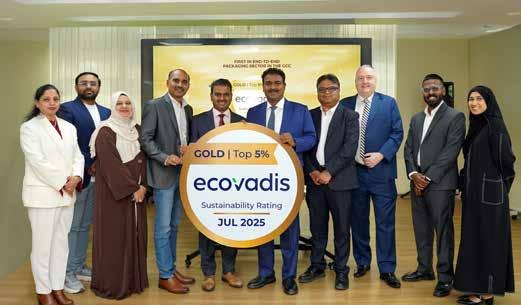

and continuous improvement throughout the value chain.
Responsible sourcing directly underpins Hotpack’s ESG vision — driving resource efficiency, reducing Scope 3 emissions, and ensuring that our growth contributes positively to people, communities, and the environment.
AM: In terms of global operations, what steps has Hotpack taken to reduce environmental impact across manufacturing and logistics?
AJ: Across our global operations, Hotpack has made significant strides in minimising environmental impact through a combination of innovation, efficiency, and responsible logistics. Our manufacturing sites are increasingly powered by solar energy, supported by extensive energy-efficiency upgrades and process optimisation initiatives that reduce both energy consumption and waste generation.
On the logistics front, we have adopted smart route planning, bulk shipment models, and to further cut down our carbon footprint. These initiatives work collectively to reduce greenhouse gas emissions across our value chain and reinforce our sustainability practices.
AM: Describe some of the milestones and goals the company hopes to achieve?
AJ: Hotpack’s sustainability roadmap is anchored in a clear vision — to achieve netzero emissions by 2050 and make sustainability a driver of innovation and long-term growth.
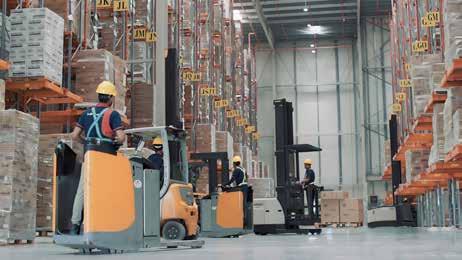
A key milestone on this journey is to increase the use of recycled and renewable materials to 100% across our core product lines, ensuring that circularity becomes central to our manufacturing model.
In parallel, Hotpack is advancing transparency in ESG reporting by aligning with GRI frameworks and integrating low-carbon logistics solutions to further reduce emissions in transport and distribution.
AM: How do Hotpack’s sustainability and supply chain initiatives align with the UAE’s Year of Community?
AJ: Hotpack’s sustainability and supply chain initiatives reflect the UAE’s Year of Community values of unity and shared progress. For 30 years, we have advanced with the nation’s sustainable vision.
Our initiatives are designed to create real social impact. Through programs like the Hotpack Happiness initiative, we promote employee well-being and community participation across our global workforce.
Our sustainable sourcing and local supplier partnerships strengthen regional economies, while our carbon reduction and recycling projects support the UAE’s broader transition to a low-carbon, circular economy.
AM: In your role, how do you personally champion sustainability at Hotpack, and how do you ensure these practices are embedded across global sites?
AJ: At Hotpack, we lead sustainability by example. I am personally involved in shaping our ESG strategy — from setting policies to ensuring execution across all business units. Sustainability isn’t a standalone goal; it’s a mindset driving every decision in operations, procurement, R&D, HR, and marketing. We have built it into site-level KPIs and performance frameworks, supported by regular training and awareness programs. With 4,300 employees across 20+ sites, our focus is on building a culture of ownership, where accountability is recognised and sustainability becomes a shared value, not just a target.
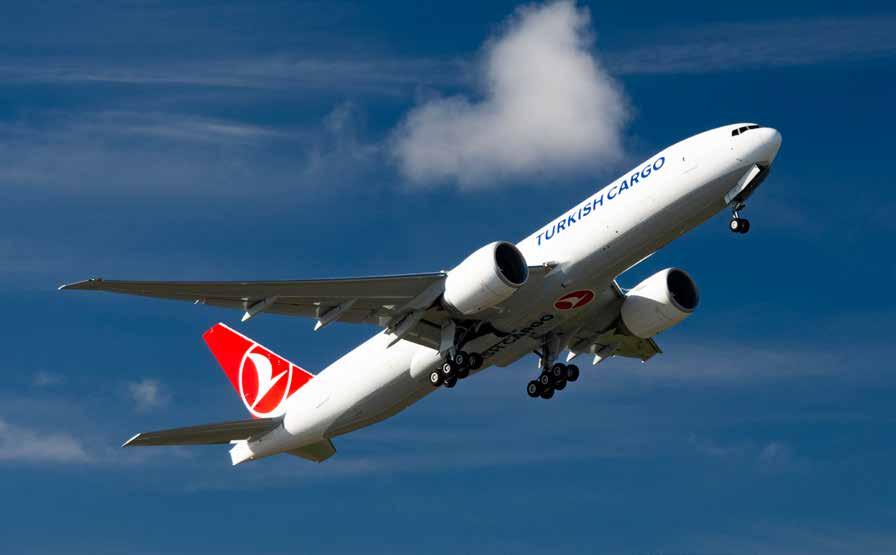
Turkish Airline’s global air cargo brand Turkish Cargo has added its ninth Boeing 777 Freighter (777F) to its fleet. The carrier will take delivery of three additional Boeing 777F by mid-2026.
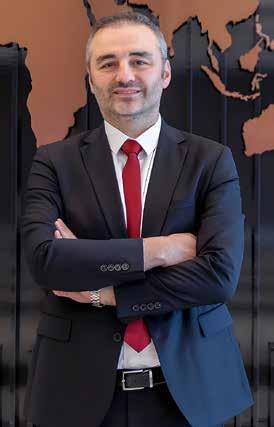
Standing out with its high efficiency, fuel savings and technical reliability on intercontinental flights, the Boeing 777F will operate on long-haul scheduled routes with its 9200 km nonstop range, primarily to the Americas and the Far East.
Turkish Airlines Chief Cargo Officer Ali Türk stated: “As Turkish Cargo, we will expand our Boeing 777F fleet to 12 aircraft in 2026, gaining an additional annual capacity of approximately 220,000 tons. This growth will contribute to our fleet streamlining and sustainability goals, while enabling us to offer our business partners greater capacity.
Beyond the advantages of fleet expansion, further addition of the Boeing 777F aircraft represents a strategic investment that enhances our operational capabilities with its extended range, superior payload capacity, and enhanced fuel efficiency. Guided by our growth strategy centred on wide-body freighters, Turkish Cargo will continue to deliver effective solutions to the needs of global trade.
Boeing Vice President of Sales and Marketing, Eurasia and India Paul Righi said: “We are excited to build on our partnership and support Turkish Cargo in its growth strategy with more 777 Freighters joining their fleet. The unique capabilities of the 777 Freighter will enhance their operations with the capacity and reach to support growing cargo market demand.”
Being one of the fastest-growing air cargo brands in the world, Turkish Cargo today provides services to more than 350 destinations in 134 countries and transports approximately 2 million tons of air cargo annually.
Within the scope of Turkish Airlines’ 2033 Vision and its target of a fleet of 813 aircraft, Turkish Cargo aims to increase its freighter fleet from 28 to 44. This growth is supported by the SMARTIST 2.0 investment, digitalization efforts, special cargo solutions, and a team of dedicated experts.
With the enhanced capacity and operational capability provided by the modern fleet, Istanbul’s position of being a strategic hub in global air transport is being reinforced further.

Returns and exchanges are inevitable but efficiency doesn’t have to be.
A smart reverse logistics strategy is no longer optional. It’s the backbone of operational resilience and customer satisfaction, especially during peak seasons.
With WAMAS Warehouse Management System, you gain end-to-end visibility, automate your warehouse processes and optimize every movement of goods, turning complexity into control.
Automate your warehouse today.
Why Choose the WAMAS Warehouse Management System?
Gain full visibility with real-time monitoring and control of every process
Synchronize workflows for seamless material flow
Customized dashboards tailored to your needs
Integrates easily with your existing systems
The collaboration powers the Orbis Flying Eye Hospital and has helped bring sight and hope to communities worldwide.
Ahead of World Sight Day, which falls on October 9th, Federal Express Corporation (FedEx), the world’s largest express transportation company, turned the spotlight to its over 40-year collaboration with Orbis International, during the Flying Eye Hospital’s goodwill visit in Dubai from September 30 to October 3. Orbis hosted guided tours of the aircraft for FedEx employees and other guests, providing an inside look at the oneof-a-kind aircraft and showcasing its shared commitment to advancing access to eye care worldwide. The visit also underscored the UAE’s role as a hub for knowledge exchange and humanitarian collaboration, making it an ideal location to raise awareness about the importance of access to quality eye care.
“We frequently bring the Flying Eye Hospital to Dubai between projects in Asia and Africa,” said Bruce Johnson, director of aircraft operations and maintenance at Orbis International. “For more than 18 years, FedEx teams at Dubai International Airport and Dubai World Central have played a vital role in supporting our aircraft—from logistics to maintenance—whenever we’re in the region. Every time we arrive, we’re welcomed like family. Their hospitality, dedication, and willingness to go the extra mile make our work smoother, more impactful, and ensure we’re ready to deliver sight-saving care wherever it’s needed next.”

Globally, an estimated 1.1 billion people live with vision loss, of which 90% live in lowand-middle-income countries. The Flying Eye Hospital was created to help close this gap. It is a fully accredited ophthalmic teaching hospital with an operating room, classroom, and recovery space. The current, third generation Flying Eye Hospital is a FedEx-donated MD-10 aircraft. Since its first flight in 1982, the Flying Eye Hospital has visited more than 80 countries, providing both training and surgeries to address avoidable blindness and vision loss. These projects equip local doctors, nurses, and other eye care professionals with the skills and knowledge to deliver life-changing treatment in their own communities.
FedEx has supported Orbis since the start, providing more than US$22 million in donations and in-kind shipping. Beyond donating the current aircraft, FedEx covers aircraft parts, maintenance, and pilot training, while FedEx pilots volunteer their time to fly the plane to all its destinations. In 2021, FedEx announced its renewed commitment to Orbis’s sight-saving mission with a US$3.5 million donation to help provide financial, logistical, and operational support to the organisation and its Flying Eye Hospital over the following five years. This collaboration is part of FedEx Cares, the company’s global community engagement program that delivers hope and opportunity to the communities FedEx serves.
“As World Sight Day approaches, FedEx is proud to stand with Orbis in creating a world without avoidable blindness and vision loss,” said Taarek Hinedi, vice president of Middle East and Africa operations at FedEx. “Welcoming the Flying Eye Hospital to Dubai is a reminder of the vital work being done across the Middle East, Indian Subcontinent, and Africa to expand access to eye care. By supporting these efforts with our resources and expertise, we are helping local communities strengthen healthcare systems and create brighter opportunities for the future.”
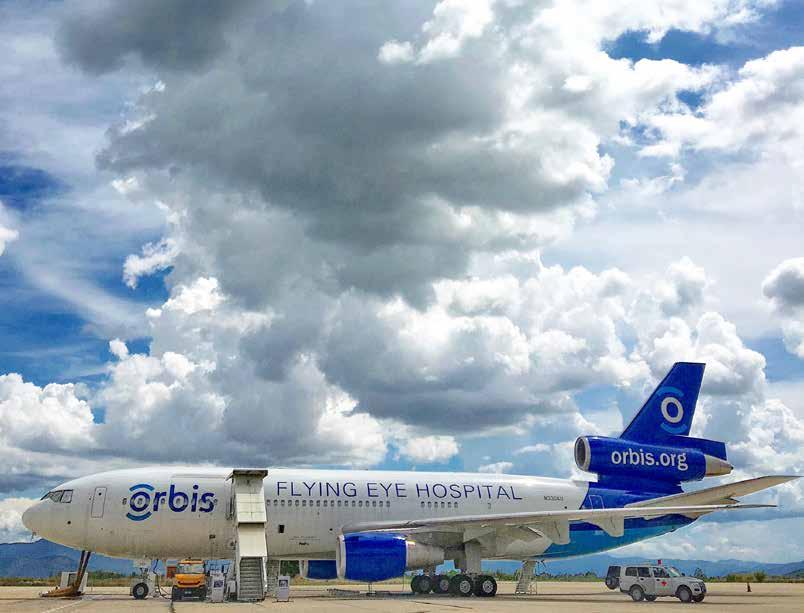
“With Orbis, I’m not just flying an aircraft— I’m part of a mission where people’s lives are changed forever,” said Captain Gary Dyson, chief pilot for Orbis International and a retired FedEx pilot. “Seeing a child regain their sight and knowing they now have a chance to learn, play, and one day support their own family is an incredible feeling. I’m proud to have spent a large part of my life working for FedEx, which made it possible for its pilots to give back in such a meaningful way.”
Alongside the Flying Eye Hospital, Orbis also works with local hospitals and clinics across Africa, Asia, and Latin America to expand access to quality eye care. Its awardwinning Cybersight e-learning and telehealth platform, along with artificial intelligence screening and virtual reality training, equip local eye care teams with the tools and expertise to treat patients more effectively.




The GCC’s logistics sector is entering a new era, where automation and digitalisation are reshaping traditional practices. At the forefront, Al Ostad Pallet Factory blends innovation with resilience to deliver smarter, more efficient pallet solutions. Under the leadership of Alex George, the company is positioning the region as a hub for sustainable, tech-driven supply chains.
As the GCC pallet and logistics industry evolves, we are seeing a transformative shift driven by automation, digitalisation, and smart supply chain solutions. At Al Ostad Pallet Factory, the focus remains on blending innovation with practical efficiency - whether through bespoke pallet manufacturing, real-time tracking, or expanding warehousing capabilities. These advancements enhance operations, while also bolstering resilience against disruptions, ensuring clients receive timely, reliable service.
By investing in technology and talent,
Al Ostad Pallet Factory - helmed by Managing Director Alex George - is preparing for the next decade of growth, helping position the region as a hub for advanced, efficient, and sustainable logistics solutions. Here, he shares insights on how these trends are shaping pallet manufacturing, smart logistics, and supply chain resilience in the GCC.
George has spent more than two decades shaping the timber and pallet industry across the GCC. Today, he leads one of the region’s most trusted names in pallet manufacturing, operating from an 80,000 sq. ft state-of-the-art facility in
Dubai Industrial City. Under his guidance, the company produces high-quality timber pallets for some of the region’s most demanding industries, while championing sustainable sourcing and innovative manufacturing practices.
Alex’s entrepreneurial journey began at just 25, when he branched out from his family’s business to set up a trading firm specialising in quality lumber. He quickly made his mark by building supply chains from Eastern Europe and Russia, establishing himself as the sole GCC agent for Severstal Group’s plywood division, and even expanding

into scaffolding and civil projects. After his father’s retirement, Alex returned to his roots, designing and launching the new Al Ostad facility and securing long-term raw material supply chains from Romania and other parts of Europe.
Global Supply Chain (GSC): How is pallet manufacturing evolving in the GCC, and what role does automation play in making operations more efficient and cost-effective?
Alex George (AG): The GCC pallet industry currently produces about 200 million units annually, and this is expected to double to 400 million in the next decade. Wooden pallets remain dominant, though plastic and corrugated pallets are gaining traction. Plastic pallets are preferred in industries prioritizing hygiene, as they resist moisture and are easier to clean. Saudi Arabia is set to build a corrugated pallet factory with a capacity of 10 million units per year.
Alex George , Managing Director, Al Ostad Pallet Factory

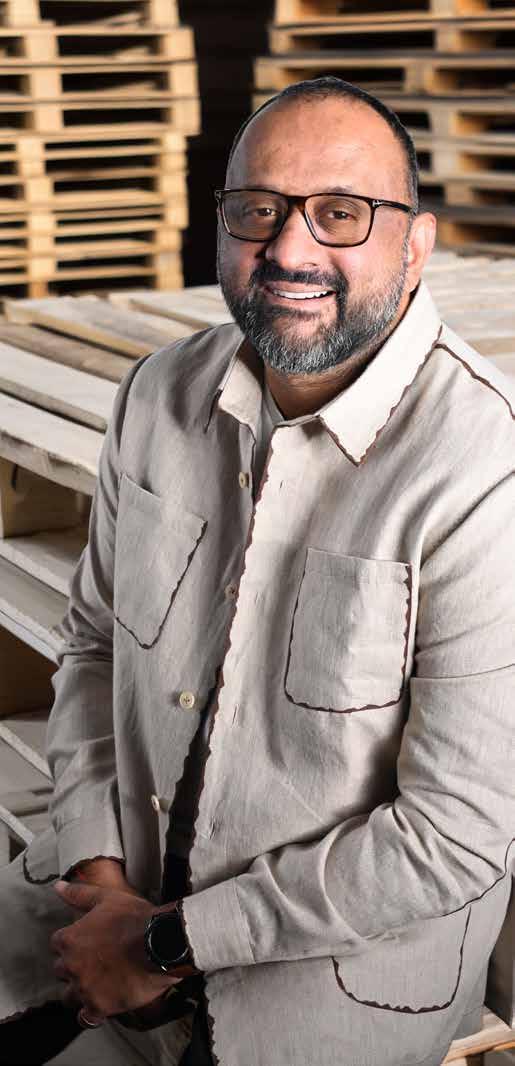
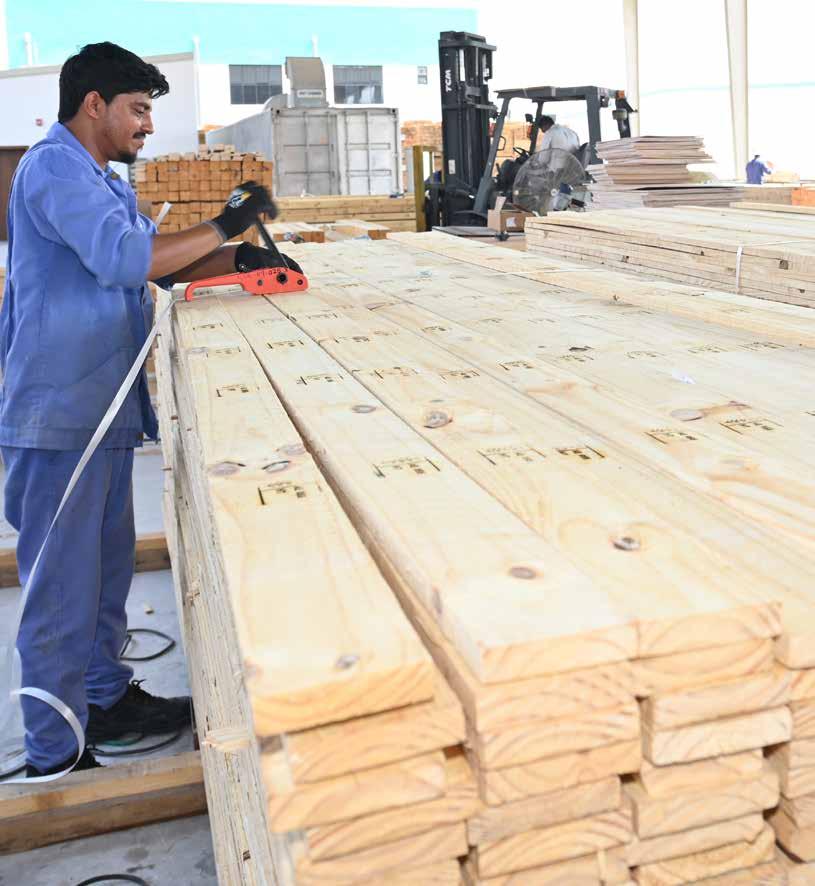

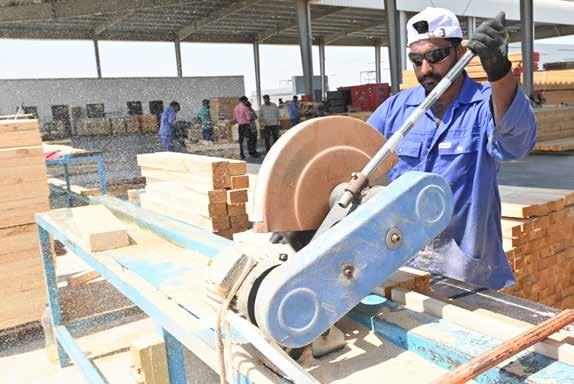
Automation has always played a role, especially in producing standard euro pallets efficiently on semi-automated lines. At Al Ostad, we focus more on bespoke pallets, where robotics could automate tasks like timber placement and nailing. However, automation must justify its capital expenditure in a region where manual labour remains cost-effective.
GSC: What are the key technologies or innovations in smart logistics that will reshape supply chains in the region over the next five years?
AG: E-commerce is driving the adoption of smart logistics, with robotics increasingly deployed in fulfilment centres. Automated storage and retrieval systems reduce labour costs and accelerate order processing. By combining machine vision to accurately identify items with robotic arms for picking, packing, and sorting, these systems improve accuracy and shorten cycle times.
AI-driven demand forecasting anticipates peak periods, such as holidays, while advanced sensors minimize spoilage of perishable goods. Cloud-based software allows inventory holders to coordinate seamlessly with logistics providers. The possibilities for smart logistics are vast, and
industry leaders like Amazon and Noon are likely to lead these innovations in the region.
GSC: How can regional manufacturers and logistics providers build greater resilience into their operations, and where do pallets fit into that strategy?
AG: Supply chain resilience has become a boardroom priority in the GCC, particularly in the wake of global disruptions such as COVID-19 and raw material shortages. Manufacturers and logistics providers are rethinking sourcing, storage, and last-mile delivery. Reducing dependence on a single country or supplier is a starting point. “Near-shoring” is a term that’s gaining steam - keeping strategic inventory in nearby GCC countries for easy access.
At Al Ostad, relocating to Dubai Industrial City aligns with the government’s Make it in the Emirates program. Proximity to Maktoum Airport supports logistics operations, while real-time pallet tracking with RFID improves transparency and traceability. Maintaining critical stock locally mitigates disruptions - for instanceshipping delays stress our manufacturing, as timber shipments are vital for timely client deliveries. In response, we invested in larger
warehouses to hold more raw materials and strengthen supply continuity.
GSC: What specific opportunities and challenges do GCC companies face balancing automation and digitalization with labour markets, regulation, and customer demand?
AG: It’s a double-edged sword. At Al Ostad, the cost of automation often outweighs the benefits of more cost-effective manual labour. Yet automation generates data that enables predictive analytics for demand forecasting, inventory management, and optimized routing. Technologies like RFID enhance trust in cross-border trade by providing real-time visibility.
Digitization requires skilled labour, making in-house upskilling and talent-attraction programs essential, as high-skill workers may eventually replace lower-skill roles.
National standards for smart cities, logistics automation, and e-commerce logistics are still evolving, and harmonizing these with global standards is essential for international expansion. While the human touch will always play a role in most industries, a hybrid system combining human expertise with automation is likely the near-term goal.
• MAN impresses with sustainable solutions at the largest international bus trade fair in Brussels
• New generation of batteries from inhouse production
With the Lion’s Coach 14 E, MAN is launching the first batteryelectric coach from a major European manufacturer. Under optimal conditions, the bus can achieve a range of up to 650 kilometres – a distance that allows many typical travel routes to be covered without recharging.
In May, MAN Truck & Bus became the first European manufacturer to present a fully electric coach with the new Lion’s Coach E. It is now celebrating its world premiere with a new design at Busworld in Brussels. We discover what drives them to success.
A second highlight at the MAN stand is the Lion’s City 12 E LE, which will be presented at the trade fair with numerous innovations for the 2025 model year. The vehicle thus represents the next major product update of the successful Lion’s City E. Particular focus is on the new battery generation with the latest lithium-ion battery technology (NMC) from MAN’s own production facility in Nuremberg. Production of the MAN BatteryPack is currently being ramped up there to a capacity of up to 50,000 units per year. The new packs feature even higher energy density, optimised safety systems and improved charging flexibility. For operators, drivers and passengers, this means greater efficiency and safety. In addition, the low-entry bus on display has Class II approval – another world premiere at the exhibition stand.
The premium brand NEOPLAN is also making a special impression at Busworld Europe. Two coaches are causing a stir in Brussels: the NEOPLAN Skyliner “Auwärter Edition”, which is celebrating its trade fair premiere, pays tribute to the brand’s heritage as a limited special edition. With its aerodynamic “Sharp Cut” design, state-of-the-art technology and nostalgic features, it combines tradition and the future. Another real eye-catcher is the NEOPLAN Tourliner C, whose D2676 LOH engine with increased power and torque,
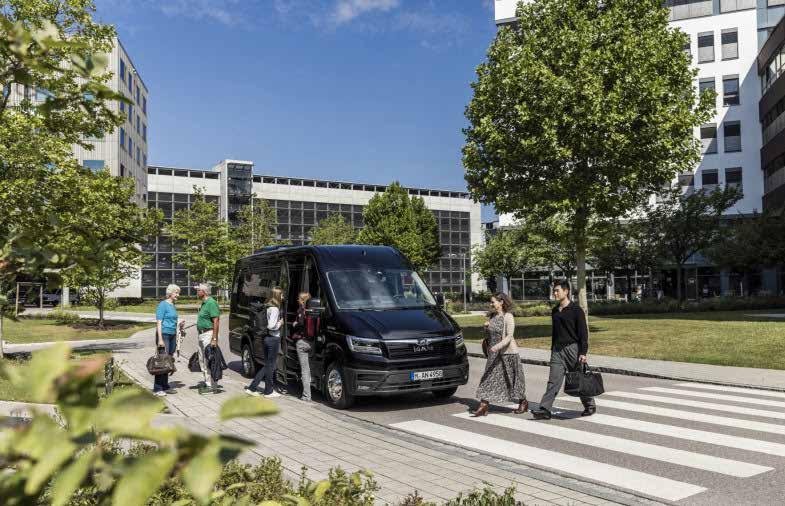
optimised drivetrain and 353 kW (480 hp) delivers fuel savings of up to 2.5 per cent.
The latest member of the NEOPLAN family scores not only in terms of comfort and economy, but also in terms of functionality and safety. The Tourliner, which can be seen at the trade fair in an eye-catching “Safe and Secure” design, is equipped with numerous assistance systems, including the innovative MAN SafeStop Assist.
“With our eCoach, we are entering a new era of emission-free travel. With the electrification of our fleet, numerous innovations in equipment and technology, and modern services, we are consistently focusing on efficient, sustainable and digitalised transport,” said Barbaros Oktay, Head of Bus at MAN Truck & Bus.
With the Lion’s Coach 14 E, which is celebrating its world premiere in Brussels, MAN is launching the first battery-electric coach from a major European manufacturer. Following the success of the Lion’s City E family, with almost 3,000 e-buses already produced for urban and interurban use, the company is now setting the next milestone in sustainable mobility. The fully electric coach uses the proven drive technology
from the successfully series-produced eTruck and innovative NMC battery packs. These are manufactured in large series at the Nuremberg plant. “By drawing on proven components from the truck sector and our many years of experience with electric city buses, bus operators benefit from high reliability and synergy effects in service and spare parts supply,” says Heinz Kiess, Head of Product Marketing Bus at MAN Truck & Bus.
The Lion’s Coach E has a usable energy capacity of 320 to 480 kWh. Under optimal conditions, it can achieve ranges of up to 650 kilometres – a distance that allows many typical travel routes to be covered without recharging. In addition to the technology, the smart design concept, which significantly reduces the drag coefficient (Cw value), is also impressive. At the same time, the eCoach offers space for up to 63 passengers without any restrictions on luggage volume compared to the diesel version.
The new packs feature even higher energy density, optimised safety systems and improved charging flexibility. For operators, drivers and passengers, this means greater efficiency and safety. In addition, the low-entry bus on display has Class II approval – another world premiere at the exhibition stand.
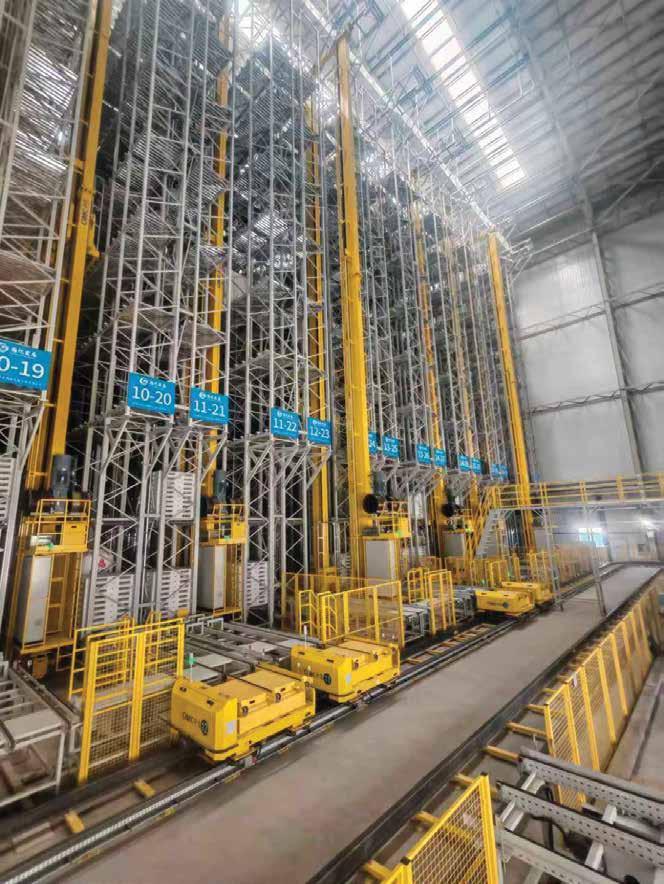
Founded in 1979 and joining ClMC Group in 2014, we are a proud member of ClMC TlANDA and a global leader in intralogistics and material handling solutions. With 40+years of expertise and 1000+ large-scale projects, we provide customized automation system solutions for industries including 3PL, retail, express, pharmaceuticals, FMCG, petrochemicals, new energy, F&B, cold storage, and CHS.
Seamless Integration: Enhance your warehouse with our automated storage systems and robotic picking solutions.
Advanced Control: Real-time monitoring and predictive analytics to optimize performance.
Scalable Solutions: Adapt to growing demands with flexible, customizable systems.



Aron.Schiller@stas.cimc.com
Linkedin: https://www.linkedin.com/in/aron-schiller/

Automation, robotics, and Artificial Intelligence (AI) are transforming global supply chains at breakneck speed. Companies are investing billions to digitise warehouses, streamline logistics, and future-proof their operations.
By 2030, the global logistics automation market alone is projected to exceed $80 billion, while PwC (PricewaterhouseCoopers) estimates automation could contribute up to $500 billion annually to global GDP by the next decade.
Marium Dahar, Founder & CEO of Bricks Executive Search, reveals more.
This is not just an industry trend; it is an economic imperative. Yet behind the headlines of smart warehouses and autonomous vehicles lies a quieter truth: technology is only as powerful as the leaders guiding it. And in supply chain, leadership remains overwhelmingly male.
The talent gap meets the gender gap
According to Gartner, women account for only 19% of supply chain executives worldwide and fewer than 10% of seniormost roles. At the same time, McKinsey research shows companies with diverse executive teams are 25% more likely to achieve above-average profitability.
That mismatch is more than a statistic. It represents a blind spot worth billions. Businesses are pouring resources into automation while ignoring half the leadership pool that could unlock its true potential. In effect, we are trying to build the supply chains of the future with yesterday’s leadership models.
The value of female leadership is not symbolic, it is strategic. Studies consistently show that women in executive roles score higher on collaboration, resilience, and long-term thinking. Deloitte found that gender-diverse teams are 30%

more innovative, while BCG reports that companies with above-average diversity generate 45% of their revenue from innovation, compared to just 26% for less diverse peers.
Real-world examples reinforce this. DHL’s Women in Logistics initiative has been credited with boosting both employee retention and customer satisfaction scores across multiple regions. In Saudi Arabia, Aramex has steadily increased female participation in logistics roles as part of Vision 2030, positioning itself as an early mover in inclusive supply chain leadership.
If innovation is the lifeblood of supply chain transformation, excluding women from leadership isn’t just inequitable, it’s economically unsustainable.
A regional advantage
The Middle East has an extraordinary opportunity to change the narrative. The region is making some of the world’s most ambitious investments in logistics infrastructure, smart warehousing, and robotics. PwC forecasts that by 2030, transport and logistics could account for
12% of the UAE’s GDP and a similar share in Saudi Arabia, where Vision 2030 prioritizes logistics as a key diversification pillar.
At the same time, the UAE boasts one of the highest rates of female STEM graduates globally (over 55%), far ahead of most developed markets. Across the Gulf, governments are embedding gender diversity into their national strategies, from ministerial appointments to corporate board representation.
This means the raw ingredients for transformation are already here: visionary infrastructure programs paired with a pipeline of educated, ambitious women ready to lead. By tapping into this pool, the region could set a global benchmark: not just in building advanced supply chains, but in building inclusive leadership that matches the scale of its vision.
In my role as Founder & CEO of Bricks Executive Search, I work with global automation and robotics companies on their most critical leadership hires. And I see a clear pattern: companies that
actively seek diverse leadership pipelines don’t just attract stronger candidates; they outperform.
Take, for example, a European warehouse automation provider I worked with recently. By bringing women into senior commercial and operations roles, the company not only improved internal culture but also achieved measurable improvements in client retention and market expansion. Diversity became a driver of performance, not a line in a CSR report.
These outcomes are consistent with global research: organisations with above-average diversity generate almost twice the revenue from innovation compared to less diverse peers. Diversity is not about optics. It is about building leadership teams capable of solving complex problems in a disruptive era.
The supply chain of the future will not be built by machines alone. It will be built by people, leaders who can inspire teams, navigate complexity, and unlock innovation. Until we break the ceiling on female leadership, we are running our supply chains with one hand tied behind our backs.
The Middle East, with its unique combination of investment ambition and female STEM talent, has the chance to lead globally, not only in building the most advanced supply chains, but in redefining what inclusive, future-ready leadership looks like.
This is not charity. This is not PR. This is competitive advantage. The businesses and nations that recognise this first will be the ones shaping the global supply chain narrative in the decades to come.
Marium Dahar is the Founder & CEO of Bricks Executive Search, a Dubai-based boutique firm specialising in leadership hiring across warehouse automation, intralogistics, and robotics. With over five years of global talent acquisition experience, she partners with leading automation and robotics companies to solve senior talent challenges across the Middle East, Europe, Asia, and the US. As one of the few female founders in this niche sector, Marium brings a unique perspective and is a vocal advocate for advancing female leadership in supply chain and automation.
Aforklift is a powered industrial vehicle used to move materials over short distances. It is a crucial element for the daily functioning of warehouses and distribution centres, and hence necessary that any downtimes or damages in forklifts are avoided. A downtime in a forklift not only means repair costs but it also means the indirect costs which will affect the overall performance of a warehouse.
A forklift repair can take between a few hours to several weeks, depending on the cause of the downtime. It is advisable to conduct regular maintenance checks to prevent major repairs. According to the Occupational Safety and Health Administration (OSHA), human error is a major contributing factor in roughly 70% of all forklift incidents. The forklift market in the Gulf Cooperation Council (GCC) countries is valued at approximately $1.41 billion. A 2024 industrial survey revealed that the average cost incurred is $260,000 for just one hour of unforeseen forklift downtime in the manufacturing industries.
Direct costs due to a forklift malfunction include repair expenses, such as purchasing spare parts and hiring a technician. These costs accumulate rapidly and end up draining the management budgets. Whilst this is the essential problem, we often fail to notice the hidden impact that downtimes have on supply chain performance. Forklift downtimes have a significant impact on the functioning of warehouses, from idle resources to dropped production efficiency which disrupts the flow of the entire supply chain.
It is important to understand that such disruptions have a ripple effect on the functioning of warehouses. Without forklifts it becomes significantly harder to move materials and inventory at the same pace rendering mobile resources effectively immobile. This results in lower efficiency among workers and within the warehouse as a whole causing production to take place at a much slower pace. This leads to delays in order fulfilments and customer dissatisfaction.
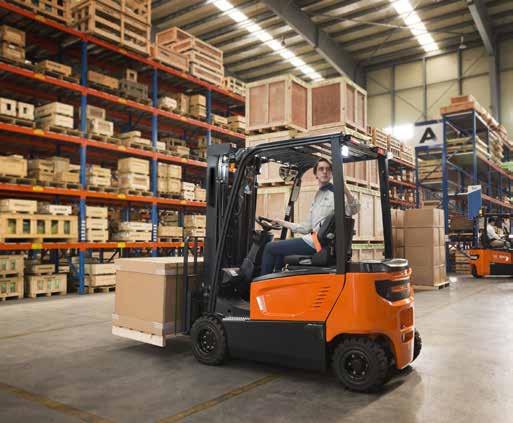
Customer dissatisfaction can lower the morale of the workers and the management. Another significant effect that equipment outages have on the supply chain are the inflated or excessive costs which could have been avoided. With delays in production, the workers and other equipment remain idle, yet the same wages and maintenance costs are paid leading to inflated costs.
This remains one side of the hidden impact of downtimes; another major aspect is the recovery period. Even after the forklifts have been restored to working order, a considerable amount of time is spent in catching up with the delays and recovering from all the logistical disturbances. Along with this, the companies also have to deal with the reputational damage caused due to missed deadlines.
In the GCC’s fast growing logistic hubs such as Dubai’s Jebel Ali’s port and Saudi Arabia’s King Abdullah’s port, even a minor forklift outage can have a multiplier effect in delays across the regional supply chains. Therefore, to avoid such significant consequences we must aim to have stricter maintenance scheduling for forklifts. It is a rule of thumb that 200 forklift hours is equal to 3000 car miles and generally forklifts should be serviced every 500 hours to minimise the risk of frequent or unforeseen downtimes.
Forklift downtimes seem like a technical setback, but their impact runs deeper. It not only affects the logistical functioning of the manufacturing industry but also has a significant impact on delivery deadlines and supply chain performances, triggering a chain reaction of counterproductive outcomes. In a region like GCC, where logistics drive economic activity and growth, it becomes a necessity to ensure that forklift maintenance is regular and such downtimes are minimised. Regular servicing, operational training and proper maintenance technologies are essential investments to ensure operational efficiency and keep the regional supply chain moving.

The pressure on bus fleets to save fuel, reduce emissions and reduce whole life costs is relentless. So, why delay the benefits of the new Allison T 2100 xFE ™ transmission, with Fuel Sense ® 2.0 software, until your vehicles are replaced? Our xFE upgrade programme is now live, offering fleets a mid-lifecycle switch with proven fuel consumption improvements of 7.13%-16%. To learn more, and join fleets such as First Bus, please contact one of our Allison Authorized channel partners Mitchell Powersystems or Powertrain Products.
















Würth Professional Solutions (WPS) delivers a wide range of advanced solutions across key sectors, including construction, automotive, and manufacturing. With an annual revenue of over $22 billion, over 80 years of global experience, and a network of more than 400 companies in 80 countries, the company’s growing footprint in the Middle East is a testament to its broader commitment to supporting the region’s ambitious growth. The company launched its extended operations in the UAE on October 1 this year.
We caught up with Angela Pernsteiner a visionary creator, catalyst, and serial entrepreneur recognised for her dynamic leadership and innovative impact across diverse industries. She serves as the driving force and visionary founder of WÜRTH Professional Solutions (WPS) and as an Executive Board Advisor to the WÜRTH Group.
Abigail Mathias: What is your vision for Würth Professional Solutions? Although it’s a complex question, I’m sure you’ve given it considerable thought.
Angela Pernsteiner: Absolutely. To understand our vision, it’s important to first understand our heritage. The Würth Group has an extremely strong legacy of eight decades. Our greatest strength has always been our immense assortment—we offer over five million articles. However, for years, we didn’t fully leverage this comprehensive portfolio in the GCC market.
We came to a pivotal realisation: the big contractors here require a complete one-stop shop. They need everything from facades and interiors to concrete, and we have it all within our group. We just hadn’t presented ourselves that way. Interestingly, the Würth Group’s structure mirrors the large, diversified family businesses common in the GCC. We are not just about our core assortment of fasteners, tools, anchors, and fixing systems. We also own three hotels, a marketing agency, a bank, and insurance and leasing companies.
This intrinsic diversification allows us to present many different faces to our clients,
attracting a very colourful portfolio because they feel understood. A company with a niche product line can’t do that. By bunding 80 years of learnings from serving diverse clients across 80 countries, we created Würth Professional Solutions (WPS) for the Middle East. This is a completely new venture for us.
In other markets, a client might go to Würth Electronics for components, to Liqui Moly for lubricants, and to Woodcraft for fasteners. Here, for the first time, we have launched a single, unified platform. You can think of us as an ‘Industrial Amazon.’ It’s a highly complex operation, requiring specific warehouses, engineers, and clientengagement strategies. We see ourselves as chameleons, adapting to and bringing out the specific strengths each client requires.
To bring this one-stop-shop industrial platform to life, we are making a substantial investment, including building a new Middle East hub in Dubai National Industries Park (NIP). The first milestone will be reached at the beginning of 2026, with a ceremonial event, and the hub will be fully operational by 2027.
WPS is structured into four key verticals to serve the market precisely. Construction, with a sub-focus on infrastructure.
Operations, manufacturing, and multiples, our newest addition, focusing on large-scale vertical farming projects.
The vertical farming initiative leverages our highly efficient LED technology. While other brands provide efficient light, our “light recipes” uniquely mimic the true solar cycle, with intensity that rises and falls like the sun, promoting a more natural growth. Given the less nutritious soil in the region and relatively affordable electricity, the potential here is enormous.
The primary requirement is the efficient LEDs calibrated for different plants—basil, rocket, and tomatoes all need different light spectra. This adaptability is what WPS is all about.
Our brand identity is also evolving. In Europe or the US, Würth is known as a screw and tool company. That’s how we started in 1945 as a trader. But we quickly evolved into a producer, and this is a critical differentiator. Owning our factories gives us unparalleled control over our supply chain. We have few
third-party producers, allowing us to adjust quality for specific formulas, like silicon or chemical anchors, and to run 24/7 shifts to meet sudden, massive client demand.
This is crucial in the GCC, where forecasting is entirely different from Europe.
The market is characterised by a “stop-andgo” dynamic with ad-hoc demand; plans change suddenly, and huge quantities of fasteners are needed overnight. Our in-house production makes us incredibly flexible.
This new chapter coincides with a leadership transition. In January 2025, the new generation—Benjamin and Sebastian Ruud, the grandsons of the founder, Reinald Ruud—took over the helm. Their leadership marks a decision to set a major cornerstone in the GCC with significant investments in infrastructure and talent, recognising the region’s immense potential for growth and diversification.
Our new brand slogan, “Decades of Mastery and Transformational Resilience,” encapsulates who we are today. Our new €80 million R&D centre in Germany, where even competitors come to test products on seismic machines, underscores our commitment to German quality—which is why we refer to it as “Decades of Mastery.” But we also understand that a client in the GCC, facing sand, sun, and unique challenges, needs different solutions than one in Europe—this is our “Transformational Resilience.” Our strategy is built on a global portfolio of experience with a deeply localised implementation.
Unlike in other countries where we might start with a sales office, here we began immediately with large warehouses and facilities because we are committed to becoming truly local. This infrastructure is essential to deliver on our 360-degree product portfolio.
A key part of our strategy is moving beyond just products to systems. For instance, we are the biggest Gatorade supplier for a major American client. We are not a drink producer, but our collective purchasing power gives us better economies of scale than the client itself.
“As a global family business, we stand for stability, reliability, and progressive growth. The Würth Group shares many parallels with the UAE, where a single visionary leader created an outstanding impact from scratch through the exceptional courage to view struggles and challenges as infinite opportunities.”
We then supply these drinks through our vending machines, or SIMATs, guaranteeing 24/7 supplies in the most remote locations—inside tunnels or at far-flung construction sites. This is a service previously unavailable in the Gulf.
In large projects, work rarely stops because a major panel ( part) is missing. The crisis often comes from running out of small, essential parts— screws, gloves, tape, silicone or adhesive. This halts the site, forcing emergency purchases that blow the budget, or leads to costly overstocking, leaving thousands of unused items after project completion.
The GCC market presents a unique supply chain landscape. Project scopes are exceptionally ambitious and fluid, scaling up or pivoting with incredible speed, making long-term forecasting a challenge. The value of a resilient and adaptable supply chain partner, therefore, becomes paramount. A contractor might need to mobilise 10,000 workers in a week and require a vast quantity of PPE—from shoes and helmets to masks—almost immediately. This is the specific need we are equipped to meet.
We provide a foundation of stable quality amidst these fluctuations. We secure operational continuity by ensuring the uninterrupted flow of all necessary materials, especially those critical C-parts that are overlooked until they are desperately needed. This is the philosophy behind our “one-touch supply chain”—a seamless process from our warehouse to the end-user.
We understand the standard procurement process for major expenditures is necessary. But applying a lengthy process involving RFQs, multiple supplier comparisons, and ten signatures to a box of screws incurs massive hidden costs. We specialise in driving the process cost for C-parts to almost zero, delivering real, measurable savings for our clients.
From a client perspective, we serve top players across all verticals. We can be their partner from the initial sketch of a building through its entire lifecycle, precisely because we provide everything from one place.
— ANGELA PERNSTEINER
AM: How large is your team in the UAE currently?
AP: We launched WPS with around 50 people and are growing fast. This is just year one of our offices in the region. Once our new warehouse is operational, the workforce will expand dramatically. Our growth is simultaneous across the GCC. We are already laying the groundwork in Saudi Arabia, with plans to launch a fully owned company there in 2027.
A fundamental aspect of our identity is that we are a fully family-owned company with no outside investors or banks. This gives us the flexibility to invest wisely and provides our clients with security. This philosophy extends to our employees, many of whom have been with us for 20-30 years. This stability, maintained despite our global size, is our founder’s legacy and distinguishes us. There is a strong family presence in day-to-day operations; we are not just signatures on a page.
AM: Looking ahead, what do you hope the company will be recognised as in the GCC in the next five years?
AP: In five years, WPS will be the major go-to partner for any industrial problem, across construction, manufacturing, and operations. We bring not just products, but eight decades of mastery. We are advisors with implementation in our pocket. In markets like Saudi Arabia, which is undergoing rapid transformation, the challenges contractors face are ones we solved decades ago in other countries. They are eager for us as a knowhow sharing partner.
Our family-owned structure allows us to co-invest in R&D for client-specific challenges, like a glue that must endure 50-degree heat for years. If it’s a relevant problem for the market, we can decide on the spot to develop it, sharing the cost rather than passing it to another client. Starting from a two-man show to a $22 billion company, this combination of heritage, innovation, and financial strength is a powerful starting point for the new generation. The GCC is hungry for know-how, growth, and quality, and we are positioned to deliver.

• Smart Hubs with RFID Gates: These gates revolutionise inventory control and security by automating the tracking of materials and assets entering or exiting a site. This provides real-time data on stock levels, prevents material loss, and ensures total transparency and control for largescale projects.
• Smart Vending Machines: Providing 24/7 access to essential tools, fasteners, and materials right at the job site, these intelligent machines use advanced inventory software to automate reordering, track usage, and dramatically boost productivity by eliminating downtime.
• Innovative PV Facade Solutions: Designed for modern architecture, these solutions combine aesthetic excellence with superior performance.
• Smart Watches: A rugged wearable designed for rigorous operational sites; it prioritises worker safety and wellbeing.
• Vertical farming with Würth LED: New and highly innovative plant-optimised lighting solutions with horticulture lights will promote the development of indoor vertical farming in the UAE and will ensure sustainable, highyield food production with minimised environmental impact.
Würth Rapid Response, is a vehicle designed to revolutionise on-site operations by providing fully functional mobile workshops and business units. This solution is a testament to the brand’s long-standing partnership with Mercedes-Benz in Germany, a strategic collaboration that now extends to the UAE in partnership with Gargash Enterprises
RSA Cold Chain, the region’s premier cold chain operator and a joint venture between UAE-headquartered RSA Global and US-headquartered Americold, announces the opening of its cold chain facility inside the Jebel Ali Free Zone, DP World’s flagship free zone in Dubai. This milestone cements RSA Cold Chain’s leading role in transforming food supply chains across the Gulf Cooperation Council (GCC), leveraging RSA Global’s digital supply chain expertise and Americold’s worldleading temperature-controlled logistics capabilities.
Located in JAFZA, the facility offers 40,000 pallet positions, increasing RSA Cold Chain’s network capacity to 62,000 pallet positions. With multi-temperature capabilities, and bonded and non-bonded storage offerings, the facility serves as a critical import-export hub connecting global food producers to the Gulf Cooperation Council (GCC)
and nearby markets. With dedicated road access to the UAE mainland, 27 loading docks, and smart monitoring systems, the site is designed to streamline regional and domestic distribution.
“At RSA Cold Chain, we’re reshaping the food distribution landscape of the Middle East, with the aim of being the single partner to scale across the region with our customers ” said Abhishek Shah, Co-Founder & Group CEO of RSA Global. “This facility is designed for tomorrow’s supply chain, digitally enabled, scalable, and resilient. Our alliance with DP World not only unlocks strategic opportunities for our customers but also reinforces Dubai’s status as the region’s anchor hub for safe, efficient, and sustainable cold chain logistics.”
“Americold is uniquely positioned to build one connected global flow of food,” said Rob Chambers, Chief Executive Officer of Americold. “The RSA Cold Chain facility in
Dubai is another step in that journey, linking producers and consumers more efficiently through strategic infrastructure and trusted partnerships. Together with RSA Global and DP World, we’re addressing real inefficiencies in the region’s food supply chain and creating long-term value for our customers.”
This facility supports traditional cold storage trade and serves quick service restaurants (QSRs), retailers, and Q-commerce platforms, offering flexible handling operations at piece, case, and pallet-level along with, co-packaging, inventory management, and customscompliant consolidation. It meets the highest international food safety standards and has earned ISO 22000 and HACCP certifications, ensuring rigorous hazard control and traceability across all operations.
DP World’s partnership is fundamental, providing unique connectivity and access across the region.
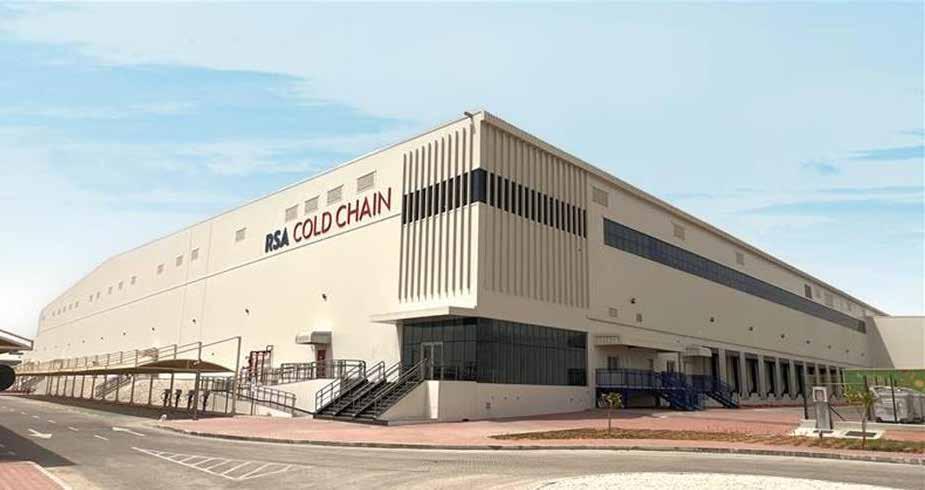
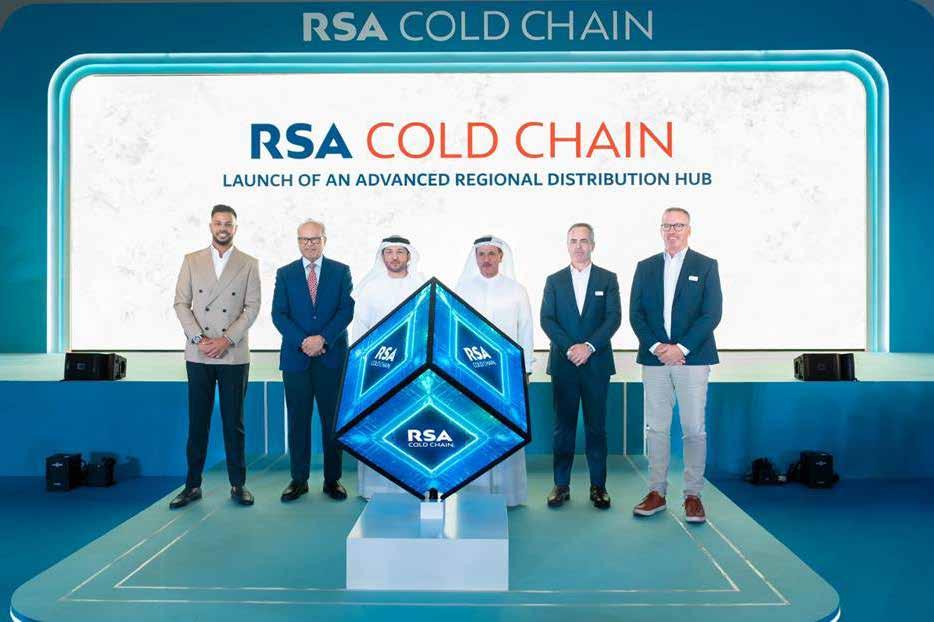

“The addition of RSA Cold Chain’s new facility boosts our ability to handle fastgrowing demand for temperature-sensitive goods, while cutting waste and accelerating time to market. Together with Americold and RSA, we are integrating infrastructure to build an efficient cold chain and advance the UAE’s food-security goals. This is exactly the kind of future-ready infrastructure that Dubai’s D33 vision calls for,” said Abdulla Bin Damithan, CEO and Managing Director, DP World GCC.
“The launch of RSA Cold Chain’s advanced regional distribution hub in Jafza marks a new chapter in Americold’s global expansion,” said Richard Winnall, President, International, Americold. “By integrating infrastructure and expertise across continents, we’re unlocking smarter, faster, and more resilient food flows for our customers.”
RSA Cold Chain serves as the catalyst for GCC food security, trade resilience, and supply chain growth, solidifying Dubai’s reputation as the Middle East’s gateway for safe and efficient food distribution.
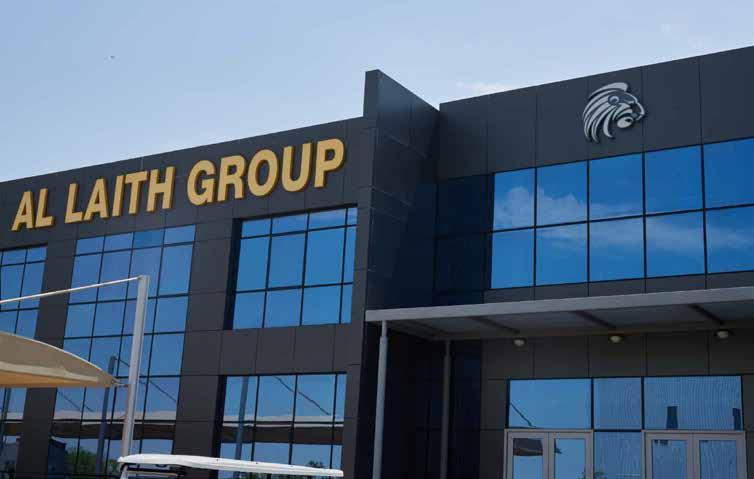
Founded in 1995, Al Laith is a trusted partner in delivering demountable infrastructure and site services across the GCC and beyond. For 30 years, the company, which is based in the UAE, has supported construction, events, film, oil & gas and national programmes, helping to shape many of the region’s most iconic moments.
With a portfolio spanning more than 20 service lines – from cabins, logistics and access solutions to mega-structures and full site overlay – Al Laith acts as a onestop partner for complex projects. As part of CG Tech, it combines regional agility with global governance, guided by a culture of safety, responsibility, agility and people first. Known for being reliable, consistent and value-creating, Al Laith specialises in making the complex simple, enabling clients to deliver with confidence.
“For three decades Al Laith has helped the region build, stage and tell its stories. Our 30th anniversary is a celebration of the people, projects and partnerships that have made us a trusted partner for the Gulf’s most ambitious moments,” said Jason English, Group CEO, CG Tech & CEO, Al Laith.
The company’s regional footprint is spread across UAE, KSA, Bahrain, Oman and Qatar, with expansion into Uzbekistan. It delivers demountable infrastructure and site solutions for construction, culture and live events, including stages, roofing, seating, bridges, sound stages, modular buildings. The company is backed by in-house expertise in logistics, planning, fabrication and EPC capabilities to ensure projects are safe, fast and reliable.
It prides itself on the following principles:
• Safety First – We prioritise our safety and that of everyone who interacts with our services and equipment. People Centric – We improve the lives of colleagues, clients, and all who engage with us.
• Agile – We respond swiftly to changing client needs and industry innovations.
• Responsible – We act with ownership, accountability, and integrity.

• 1995 – Founded in Dubai as a scaffolding company
• 2000 – Launched plant and machinery rental services in the UAE
• 2005 – Entered the UAE events sector, supporting major public and private events
• 2007 – Expanded into temporary facilities solutions
• 2010 – Regional expansion into Oman
• 2016 – Acquired by CG Tech, reinforcing commitment to innovation and safety
• 2019 – Expanded into Saudi Arabia’s events market
• 2021 – Advanced oil & gas capabilities in the UAE with specialised tank farm access solutions
• 2022 – Broke ground in KSA’s oil & gas sector with scaffolding services
• 2023 – Acquired Mecton Qatar, expanding cabins and SPIR solutions; introduced specialist low-level access equipment for enhanced safety
• 2024 – Entered Uzbekistan; introduced Flydeck to the Middle East with Pilosio
• 2025 – Expanding into Saudi Arabia’s film & entertainment sector; celebrating 30 years of safe, reliable, people-first delivery












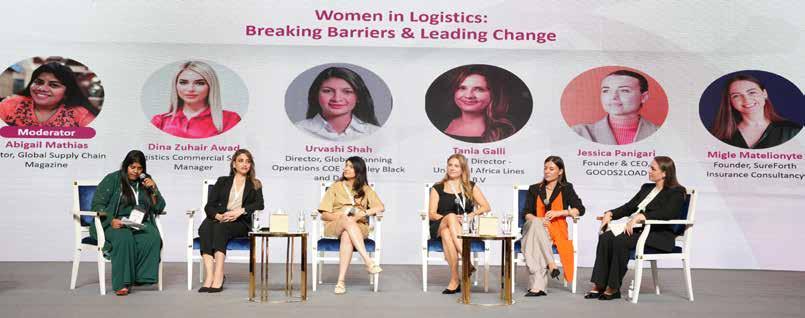
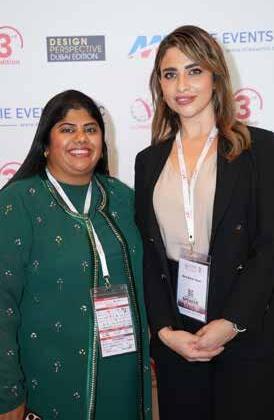
Leading members of the supply chain fraternity gathered at Atlantis, Dubai on October 8 and 9 for CTW’s awaited event. From Sustainability with Purpose, Women in Logistics – Breaking the barriers and Warehouse Automation, to Sustainable Trade, the event hosted a number of panel discussions engaging for audiences that arrived from across the world. The event also saw discussions on design and hosted a large interactive exhibition. We take you behind the scenes straight to where all the action took place.
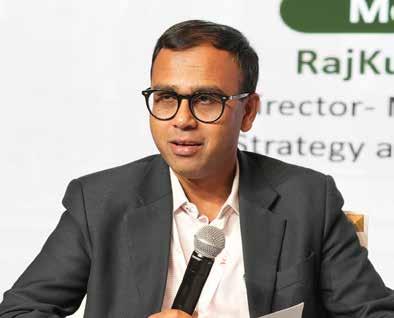

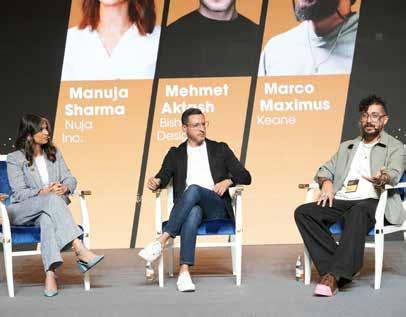
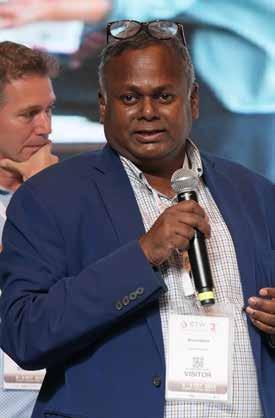
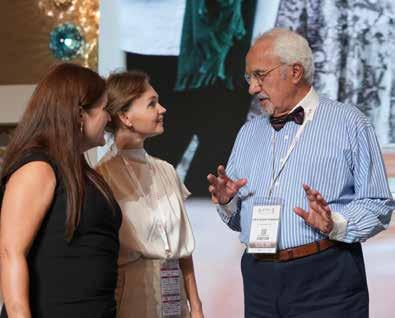

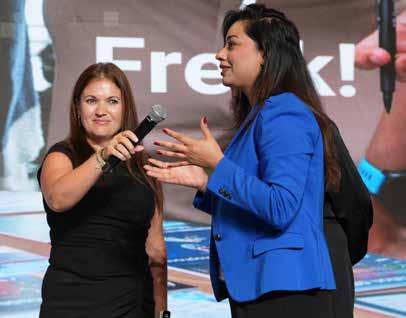
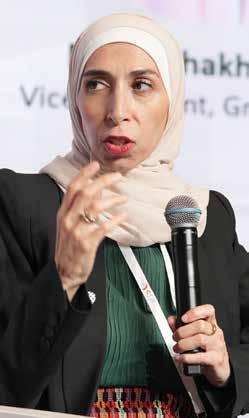
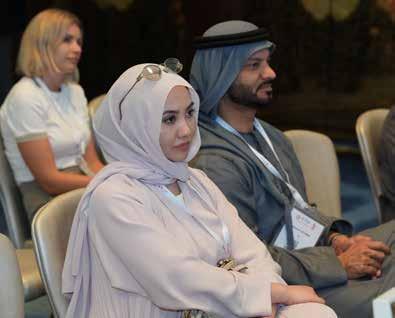
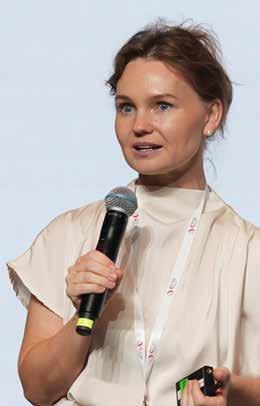

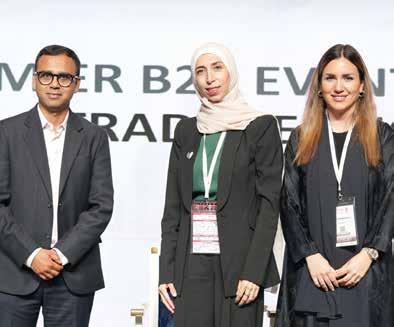
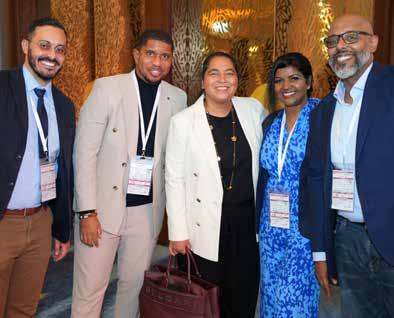

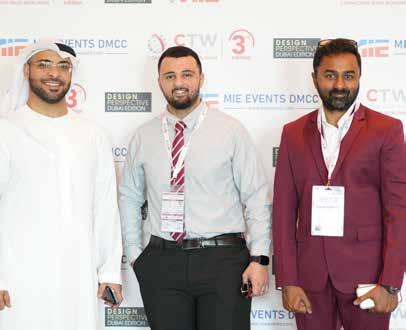
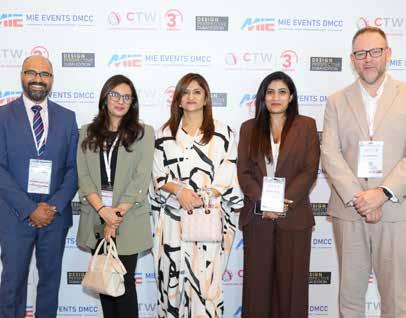


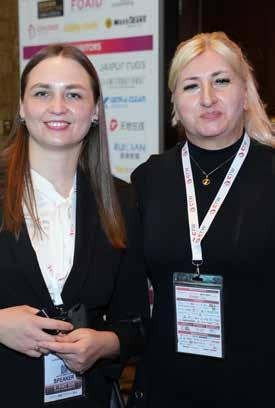
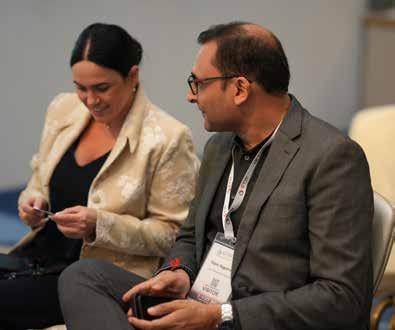
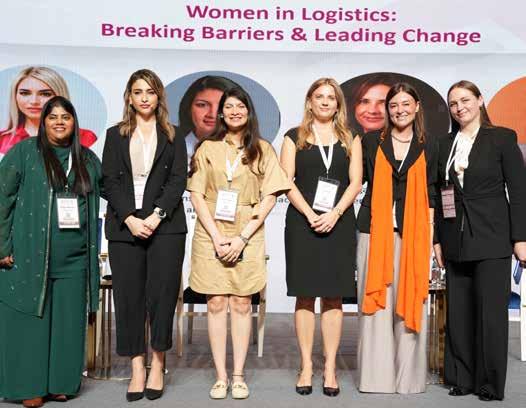
For over 15 years, Oliver Wyman has been a key strategic advisor embedded in the pioneering economic diversification plans of the UAE. Positioned at the forefront of advising on the most complex transitions in transportation, logistics, and public infrastructure, the firm’s pivotal role was exemplified at the Global Rail Transport and Infrastructure Exhibition and Conference in Abu Dhabi, from September 30 to October 2, 2025, at the Abu Dhabi National Exhibition Centre (ADNEC).
The event brought international stakeholders together to discuss the future of rail, highlighting the themes of infrastructure, global connectivity, and sustainable and intelligent mobility solutions.
This deep regional commitment was illustrated by Alessandro Tricamo, partner, Transportation and Services Practice, Oliver Wyman.
Tricamo moderated a panel discussion on shaping the future of mobility and tackling the data sharing dynamic. Bringing 20 years of valuable experience in consulting and industrial practises to the table, his expertise represents the practical insight that Oliver Wyman delivers to the clients.
Abigail Mathias: What are some of the key takeaways from your panel, “Shaping the future of mobility: tackling the data sharing dynamic.” Alessandro Tricamo: The common theme was that data is obviously critical for innovation in the space of mobility. Everything that is linked to mobility as a service, customisation, bespoken solutions, etc., is linked to data. Data will train AI models and now will push for this level of, bespoken solutions for mobility.
The discussion allowed the opportunity to discuss both with operators, CEOs of different mobility operators, and the Director General of ITC. There were, three major takeaways. The first one is that the use of data needs to be encompassed in a clear regulatory framework, so that privacy and information protection are both critical.
However, at the same time, that should not limit the possibility that the collection and use of data would provide. What is needed is for the operator and regulator to find the right balance and to define what are the clear rules for the use of this data, which link directly with the second takeaway, which is partnership between different entities. The importance of operator and regulator to partner for the benefit of passengers through the use of data, was also highlighted.
The third takeaway was how to make sure that the data is used properly in a way that the regulator takes a bit of the driving role. The Director General of ITC mentioned the creation of data warehouses or data pools. Being under the control of the regulator would facilitate protection at the same time.
AM: In your opinion how will the rail sector contribute to the economy of the GCC region?
AT: There are multiple answers to this question. I think that there are several ways that rail can contribute. Firstly, the rail concept has always been taken a backseat in the GCC.
While plans were made, there were delays when it came to implementation. In the last three to five years, there has been a big push in accelerating the deployment of rail. This is because finally it was clear that connectivity across the different GCC countries would provide a big upside in economic development. The free flow of material across the different countries, the cost saving that rail provides compared to trucking, the fact that there is a push on industrial development that goes hand in hand with the development of a mass transport system like rail, facilitating the potential of trade across the different countries, but even beyond.
The connectivity of the GCC through rail will provide a big benefit in terms of potential trade and free flow of people and material. Looking beyond this, the ability to connect the region with other countries in the broader Middle East and potentially through that with Europe, Asia and the

like, will open a set of new possibilities in terms of trade and economic development and new logistic corridors. There is a lot of discussion around the logistic corridor in Iraq with Turkey and Europe. Think of the potential that connecting the GCC rail through Kuwait or Saudi Arabia to this corridor would create for the entire region.
In a nutshell, the possibilities are limitless. Obviously, there is a big push on spending that unfortunately goes with mega projects, but the upside is such that potentially we will see big development in the coming years.
AM: Could you explain how Oliver Wyman is tracking the growth of the rail industry in the Middle East?
AT: Events like this are proof that there is interest in pushing rail connectivity and rail deployment in the Middle East. Hopefully, we can help keep the momentum alive.
It would be helpful if the sector, the community of the rail industry can work together to identify where potential alternatives to the traditional government funding schemes available. Obviously, the government will always, play the lion’s share in such large projects. However, there are specific selected opportunities where private sector financing can make the difference.
Most of the passenger lines in the Middle East are also operating freight, so they operate on a mixed traffic solution. That is because, as we said, the development is costly, so you try to maximise the capacity and efficiency.
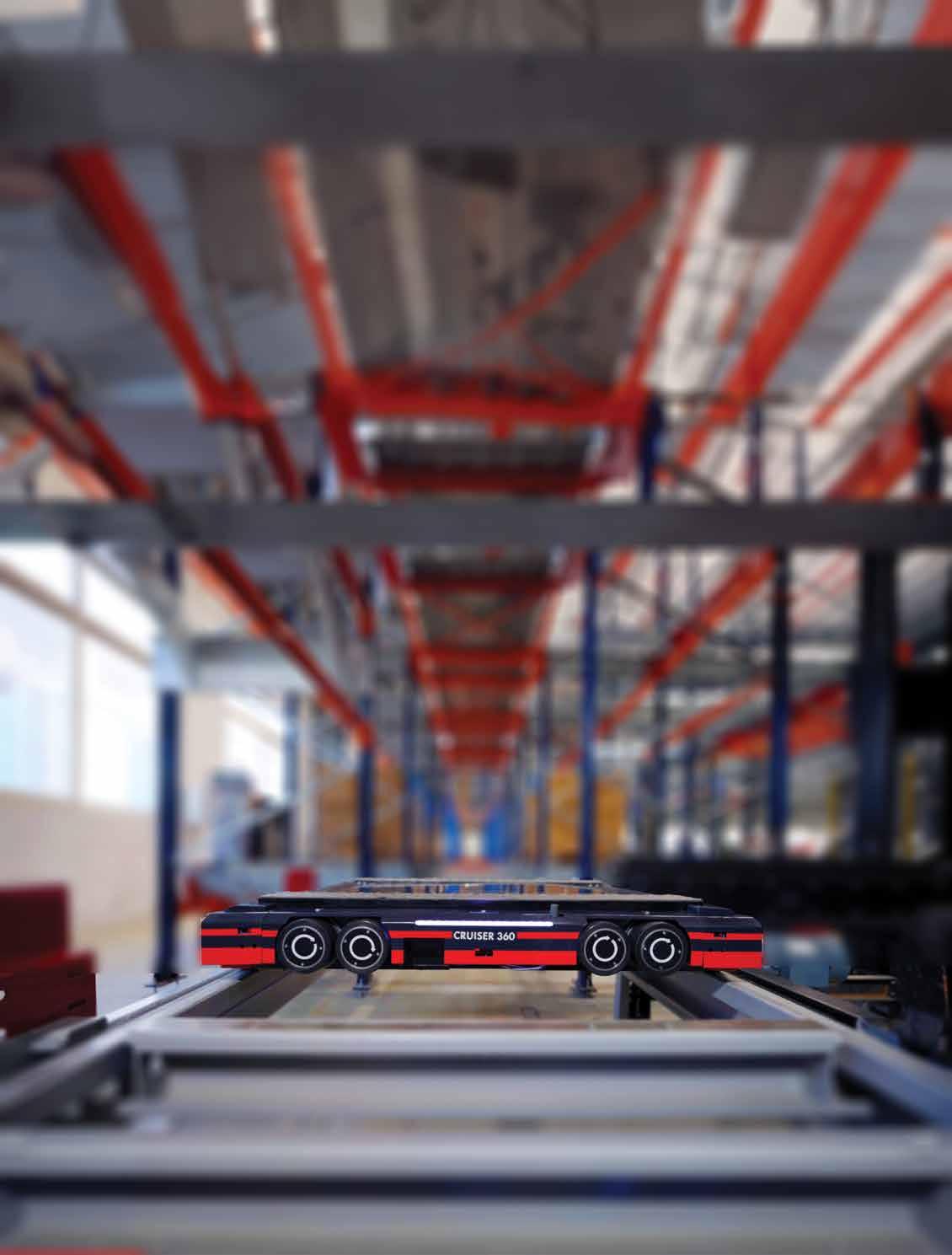
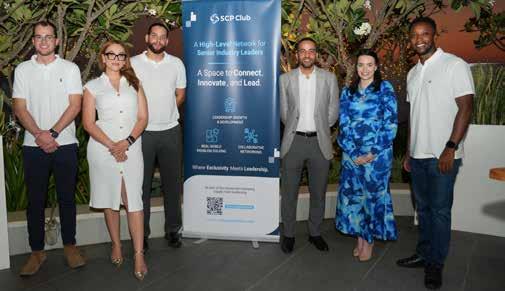
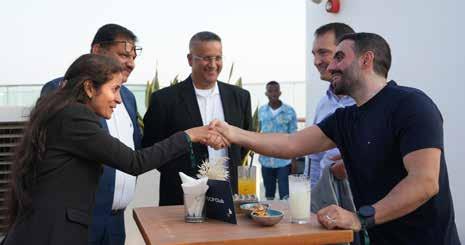
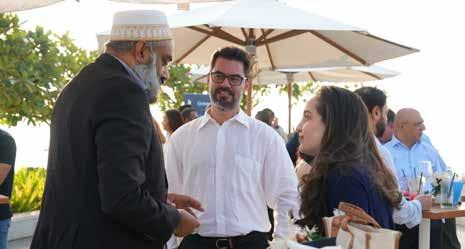

High above the city skyline, 77 floors up at ZETA Seventy-Seven, supply chain leaders from across the Middle East gathered for a different kind of networking experience- one that prioritised people over products and conversation over competition.
The inaugural Supply Chain Professionals Club (SCP Club) Networking Event marked the official launch of a new movement designed to transform how the region’s decision-makers connect, collaborate, and lead. Brought together under the theme “Breaking Silos. Building Futures,” senior executives, directors, and innovators from diverse industries engaged in discussions that went far beyond operational KPIs and quarterly targets.
Unlike traditional industry events, the SCP Club deliberately adopted a non-sales, peerled approach, fostering an atmosphere of openness and trust. Conversations focused on shared challenges, leadership growth, and the evolving role of collaboration in building resilient supply chains.
“In today’s environment, the leaders who thrive are those who connect, listen, and collaborate beyond boardrooms,” shared one founding member during the event.
The Supply Chain Professionals Club MEA was founded with a simple yet powerful mission: to place people at the heart of progress. Operating as an independent, non-commercial community, it is built on five key principles- curation over quantity, leadership-led collaboration, confidentiality and trust, cross-industry connection, and purposeful contribution.
The club’s approach goes beyond oneoff gatherings. Each quarter, the SCP Club will host a curated networking experience complemented by an executive learning or thought-leadership session. These sessions will focus on key themes such as innovation and AI, sustainability, market intelligence, and leadership development.
Through these initiatives, the SCP Club aims to bridge gaps across industries, functions, and geographies- breaking down the silos that have long hindered collaboration within the supply chain ecosystem.

Sponsored by Slimstock, the initiative was first introduced during the company’s annual Customer Day in Dubai earlier this year. Since then, a diverse group of founding members representing various industries has joined forces to shape the club’s direction.
Led by Rachid Labrik, CEO of Slimstock MEA, and Ioana Brumă, Head of Events & Partnerships at Slimstock MEA, the community has quickly gained momentum. What began as an idea to connect leaders beyond titles and industries has evolved into a fast-growing network of professionals committed to advancing the region’s supply chain maturity.

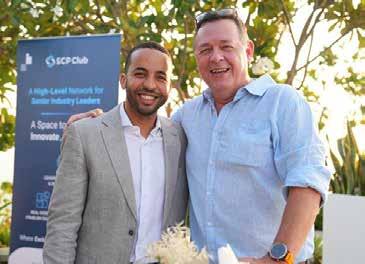

The first SCP Club networking event was not about product demos or PowerPoints; it was about people. Over drinks and panoramic views, attendees shared stories of leadership, lessons learned from disruption, and bold ideas for the future.
The evening concluded with one clear takeaway: when leaders connect beyond silos, the entire industry moves forward.
Looking ahead, the founding members are already shaping plans for upcoming events focused on AI in supply chain, sustainable operations, and leadershiptopics essential to the region’s long-term competitiveness.
The Supply Chain Professionals Club MEA is a peer-led community built for senior supply chain professionals across the Middle East. Its mission is to foster collaboration, innovation, and leadership beyond traditional business boundaries. Sponsored by Slimstock, the SCP Club operates independently and aims to drive progress across industries through quarterly networking experiences, executive sessions, and knowledge-sharing initiatives.
The significance of warehousing and robotics and the future of automation and fulfilment in the region was recently discussed at CTW’s two day event at Atlantis, Dubai. Umer Saleem, VP Sales and Business Development, Middle East & North Africa, HWArobotics moderated an infocus panel with leading specialists in the region. We bring you excerpts.
An insightful discussion on warehouse automation, robotics innovation, operational efficiency, and transformative supply chain solutions across the Middle East and North Africa region captivated the audience in the UAE. Here’s what many professionals discussed.
Nilay Gosavi – Logistics and Procurement Head, Phoenix
US: From a logistics and procurement perspective, what challenges and opportunities do you see in integrating warehouse automation to optimise the supply chain?
Integrating warehouse automation comes with challenges such as system integration, workforce adaptation, and upfront investment. Yet, the opportunities are immense. Automation increases accuracy, throughput, and real-time visibility, while
reducing operational risks. It allows supply chains to scale efficiently, respond faster to market demands, and optimize resource allocation. By aligning automation with strategic sourcing and operational workflows, we can transform warehouses into highly efficient, agile hubs that drive long-term growth.
US: How does Phoenix measure the impact of automation on efficiency and cost savings in its operations?
At Phoenix, we track automation performance using metrics like order fulfillment speed, inventory accuracy, labor productivity, and operational costs. These KPIs allow us to quantify efficiency gains, evaluate return on investment, and continuously refine processes. By analyzing these results, we ensure automation delivers measurable cost savings while supporting

strategic objectives and enabling sustainable, scalable growth across our supply chain operations.
Alain Kaddoum – Managing Director, Savoye Middle East
US: Savoye specialises in intralogistics solutions; what emerging technologies do you believe will drive the next wave of efficiency in automated warehouses?
AK: “Modern warehouses are evolving into smarter, safer, and more connected environments,” Kaddoum explained. “Artificial Intelligence (AI) is enabling autonomy in decision-making, helping optimize operations in real time, while LiDAR technology is enhancing safety and precision by allowing robots to navigate and work efficiently alongside operators.”
US: How do you ensure that automation solutions are scalable and adaptable for diverse warehouse operations in the region?
“Beyond the technology, successful warehouse automation comes down to getting two things right,” Kaddoum noted. “First, a scalable and future-ready design that allows for easy expansions and integration of new workflows. Second, the selection of the right systems—based on customer data and flexible enough to adapt to future operational changes.”
He highlighted that scalability and adaptability are now essential in the Middle East’s fast-evolving logistics landscape. Companies that prioritize flexible design and data-driven decisionmaking are best positioned to achieve long-term success in automation. As the region continues its digital transformation journey, insights from leaders like Alain Kaddoum underscore how innovation, when guided by strategy and scalability, will define the future of fulfillment.
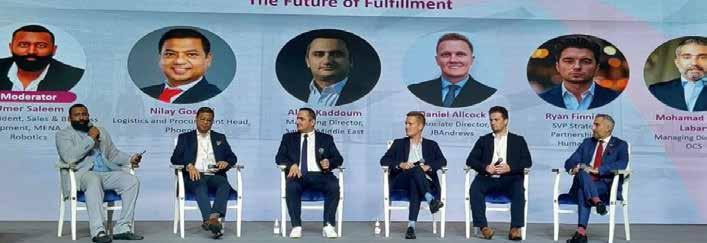
Ryan Finnigan – SVP Strategic Partnerships – Humanoid
US: As a thought leader in supply chain management, how do you foresee warehouse automation and robotics shaping the future of fulfillment across the MENA region?
“Automation and robotics are no longer just about efficiency—they’re about enabling agility, scalability, and resilience,” Finnigan explained. “Across the MENA region, we’re seeing businesses transition from manual, labour-intensive operations to fully integrated digital ecosystems where data, robotics, and human intelligence work seamlessly together.”
He added that the demand for faster, more reliable fulfillment is driving investment in automation technologies, particularly as regional hubs like the UAE and Saudi Arabia position themselves as global logistics leaders. “The future of fulfillment here is smart, connected, and human-centric— where automation empowers people rather than replaces them.”
US: What emerging trends in robotics and AI should companies focus on to stay competitive in the next 5 years?
Finnigan pointed to AI-driven predictive analytics, autonomous mobile robots (AMRs), and human-robot collaboration as key trends shaping the future. “AI is enabling predictive decision-making—helping companies anticipate demand, optimize routes, and reduce downtime. Meanwhile, AMRs are becoming more intelligent and adaptable, capable of dynamic navigation and multitasking across complex environments.”
He emphasised that success in the next five years will depend on how companies integrate these technologies into holistic strategies. “The winners will be those who view robotics not as a standalone investment, but as part of a connected digital transformation journey—one that links people, process, and performance.”
As the MENA region continues to evolve into a global logistics powerhouse, Ryan Finnigan’s insights underscore the critical role of innovation, strategic thinking, and human-technology collaboration in shaping the future of warehouse automation and fulfillment.
Daniel Allcock – Associate Director, JBAndrews
US: From a consulting standpoint, what are the key considerations companies should evaluate before investing in warehouse automation projects?
“Automation is not a one-size-fits-all solution,” Allcock explained. “Before making the investment, organizations need to conduct a thorough assessment of their operational needs, scalability goals, and internal talent readiness.”
He emphasized the importance of aligning automation initiatives with a company’s broader business strategy. “It’s essential to consider not just the technology itself, but how well the workforce can adapt to and manage it. The most successful automation projects are those that blend innovation with strong change management and leadership alignment.”
US: Can you share an example where automation significantly transformed a client’s fulfillment operations?
Allcock shared an example from a recent client engagement where warehouse automation completely redefined operational performance. “A global logistics provider we supported implemented a robotics-based fulfillment solution that reduced picking time by over 40% and improved accuracy rates to 99.9%,” he noted.
“What made the transformation sustainable was not just the technology—it was the people. By upskilling staff and redefining roles, the company built a culture that embraced innovation and continuous improvement. That human
factor is what truly drives long-term success in automation.”
As the supply chain landscape becomes increasingly digital and data-driven, Daniel Allcock’s insights reinforce that the future of fulfilment depends on the balance between technology and talent—where automation enhances capability, and people lead the transformation forward.
Mohamad Abou Laban – Managing Director, OCS
What challenges and opportunities do you see in modernizing logistics operations?
MAL: Modern logistics faces challenges like rising customer expectations, complex supply chains, and digital integration. However, technology adoption and process optimisation create opportunities for faster, more accurate, and cost-effective service delivery. By investing in workforce training, data-driven insights, and automation, companies can significantly reduce errors, enhance responsiveness, and create more resilient operations that scale efficiently with business growth, ultimately improving client satisfaction and competitive advantage in an increasingly demanding market.
US: How is OCS driving innovation and efficiency in the region?
MAL: OCS is embracing cleaning robots to enhance efficiency, consistency, and safety across facilities. By combining automation with skilled staff, we deliver superior hygiene standards while reducing operational costs. These robots also free our teams to focus on specialized tasks, improving overall productivity. In addition, the integration of smart sensors and real-time monitoring allows us to track performance, predict maintenance needs, and maintain compliance with strict health and safety standards, ensuring our clients experience reliable, high-quality cleaning services at all times.
Reverse logistics, the process of moving goods from consumers back to sellers or manufacturers, has evolved from a reactive necessity to a strategic component of modern supply chains. With the global reverse logistics market projected to grow from USD 823 billion in 2024 to USD 3.18 trillion by 2033, expanding at a compound annual growth rate (CAGR) of 17.4 per cent, organisations are increasingly recognising its potential to recover value and enhance sustainability. E-commerce has profoundly transformed reverse logistics, presenting both challenges and opportunities for businesses. One of the primary challenges is the significant increase in return volumes, as online purchases often have higher return rates compared to traditional retail. This surge necessitates robust reverse logistics systems to manage the influx of returns efficiently. Additionally, heightened customer expectations for hassle-free return processes, including easy shipping and prompt refunds, place further pressure on organisations to streamline their
Effective reverse logistics management not only helps companies minimise the financial impact of returns but also enables them to recover value from returned products through refurbishment, remanufacturing, or recycling.
Reverse logistics also covers the return of empty containers. Managing reverse logistics for empty containers is a critical component of supply chain efficiency, particularly in industries reliant on shipping and transportation. This process involves systematic returns, repositioning, and reuse of empty containers after they have delivered their cargo. Effective management of this reverse flow is essential for minimizing costs, optimizing resource utilization, and enhancing sustainability.
While reverse logistics is essential for sustainable business operations, it presents multiple challenges that can significantly affect profitability and environmental performance. High operational costs are one of the foremost barriers. The process involves several stages: transportation, sorting, inspection, repackaging, and restocking, all of which require extensive coordination and resources. For instance, the UK fashion industry alone incurred returns-related costs amounting to approximately GBP 7 billion in 2022, reflecting the financial strain that inefficient reverse logistics can impose on retailers and supply chains.
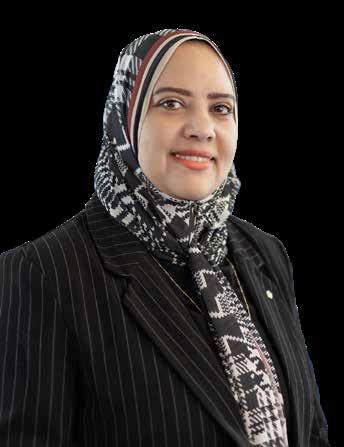
Environmental impact is another critical concern. Returns management contributes significantly to carbon emissions due to the additional transportation and energy consumption required during handling and processing. In 2022, reverse logistics activities in the UK were estimated to have generated nearly 350,000 tonnes of CO₂ emissions. This figure underscores the urgent need for greener logistics strategies, such as optimising route planning, implementing digital tracking systems, and investing in circular supply chain practices that reduce unnecessary transport and waste.
Depreciation of returned goods poses an additional challenge, particularly in industries dealing with high-value or fast-moving products like electronics. Returned items can lose value rapidly due to technological obsolescence or damage during transit. To mitigate this, companies must adopt efficient reverse logistics systems that enable rapid inspection, refurbishment, and redistribution. Streamlined processes help recover value by minimising depreciation and maximising resale or reuse potential.
For empty containers, one of the primary challenges in managing reverse logistics is the unpredictability of return flows. Variability in shipping schedules and demand can lead to an imbalance in container availability, resulting in either shortages or surpluses. Additionally, the logistics of repositioning empty containers to locations where they are needed can be complex and costly, often requiring sophisticated planning and coordination.
Key enablers for enhancing reverse logistics practices include:
Integrating advanced technology into the reverse supply chain ensures efficient handling of product returns. Real-time tracking systems, analytics platforms, and automated workflows enhance coordination, speed up processing, and enable informed decision-making.
Partnering with reliable logistics providers enhances the reverse supply chain by offering expertise in transportation, returns handling, and best practices. These partnerships ensure seamless coordination, leveraging advanced technology to achieve faster processing and cost reductions. Reliable logistics providers also support sustainability efforts through responsible waste management and recycling programs.
By Dr. Shereen Nassar, Global Director of Logistics Studies and Director of MSc Logistics and Supply
Chain Management Suite at Heriot-Watt University Dubai.
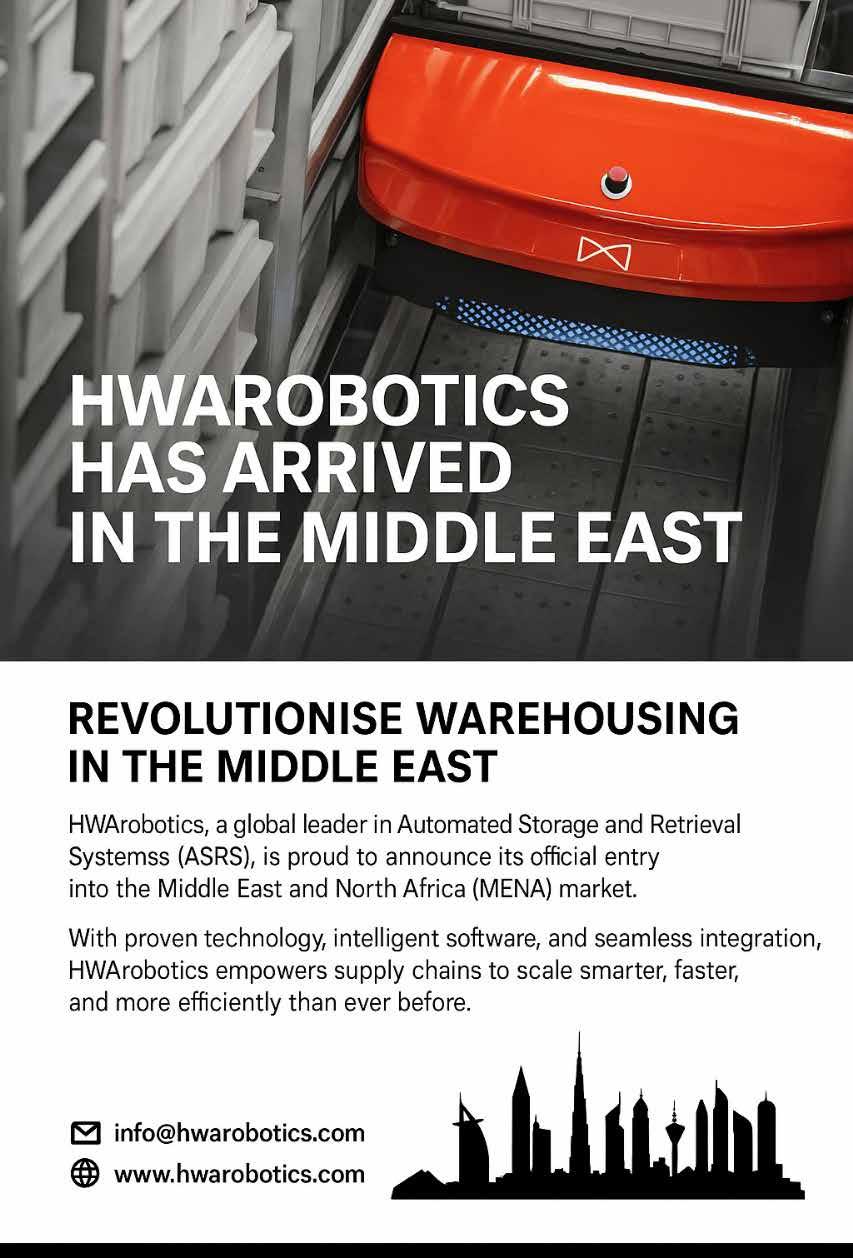
The International Air Cargo Association (TIACA) will host one of its biggest events in the region. Building upon the momentum of ACF 2024, which welcomed over 250 exhibitors and attracted more than 3,500 unique visitors, the Air Cargo Forum 2025 (ACF 2025) will take place in Abu Dhabi at the stunning Etihad Arena from November 3-6, 2025.
This global gathering is where the industry’s future takes shape, bringing together the people, ideas, and solutions that will define tomorrow’s air cargo and logistics landscape. ACF 2025 will continue to be a world-class global event, bringing together the entire air cargo community to foster innovation, collaboration, and growth within the industry.
Among the many anticipated sessions, the current TIACA Chair, Steven Polmans, who has served in that capacity for six years and with his term concluding at the end of 2025, attendees will hear from him regarding the highlights of his term and his hopes for the future of TIACA.
From dynamic exhibitions, strategic sponsorship opportunities, and impactful advertising platforms to unparalleled networking moments, ACF 2025 promises a comprehensive experience. Attendees can look forward to exciting new features, including a desert golf tournament, exclusive cultural excursions, vibrant receptions, and
PROGRAM HIGHLIGHTS
OASIS-SIDE CHATS: Stanislas Brun, Chief Cargo Officer, Etihad Cargo; shares insights on the carrier’s vision and the evolving role of Abu Dhabi as a logistics hub.
Tom Bradley, Director and General Manager Amazon Air Cargo; will share insights on their strategic plans
INDUSTRY LEADERS ROUNDTABLES
Martin Drew, Atlas Air; Dirk Gooevaerts, Swissport; Wilson Kwong, HACTL; Asok Kumar, Morrison Express; Sanjeev Gadhia, Astral Aviation; and Chris McDermott, CHAMP Cargosystems; exchange perspectives on key industry challenges and opportunities
DIGITALISATION IN AIR CARGO
Vitaly Smilianets, Awery Aviation Software; Radhesh Menon, IBS Software; and


thoughtfully curated after-parties. In the captivating city of Abu Dhabi, one of the world’s most renowned destinations for luxury and culture, we’re offering more than just an event—it’s a journey of connections, learning, and enjoyment.
Sustainable Aviation Fuel will also be discussed as well as how air transport supports both medical deliveries and agricultural exports
The Air Cargo industry is influenced by evolving consumer trends, shifts in consumption and production as well as impacts from technology and automation. We will hear from Marco Bloemen, Managing Director, Aevean as to what future trends will
Antonia Ambrozy, WebCargo by Freightos; examine technology’s role in driving efficiency and resilience.
Middle East as a Global Gateway Nadia Abdul Aziz, NAFL; Hashim Alshrif, Saudi Cargo; and Steven Polmans, TIACA; will dive into regional infrastructure growth.
WORKFORCE CHALLENGES
Roos Bakker, ICTS, Moaza Al Falahi, Emirates SkyCargo, Roland Zistler, Aviation NOW; and other panelists will address attracting, developing, and retaining talent in a competitive global market.
AVIATION NET ZERO: Emma Murray, Meantime Communications; Helene Goury, Air France KLM Cargo; and Noora Al Sharhan, Etihad Cargo and other panelists will discuss what the industry needs in order
impact the air cargo industry.
Hashim Alsharif, Vice President, Strategy and Business Development.
Saudia Cargo will also be speaking about plans for air cargo in the region.
The organisers believe its goal is to create an event that not only adds immense value to the sector but also delivers an unforgettable experience for all attendees. “This year’s program reflects the breadth and depth of the issues shaping our industry. From digital innovation to workforce development, ACF 2025 will bring the right people into the right conversations at the right time.” said Steven Polmans, TIACA Chair.
to achieve Net Zero Operations by 2050.
INDUSTRY INNOVATION: Amar More, Kale Logistics Solutions; and Jessica Panigari, Goods2Load together with other panelists to be announced soon will explore how the air cargo industry compares to other leading industries when it comes to the rapid deployment of AI, automation, robotics and other tech-based tools.
INDUSTRY TRENDS AND OUTLOOK
Ryan Keyrouse, Rotate; and Marco Bloeman, Aevean; will dive into the future of the industry and share what we should expect.
ECOMMERCE: Sanele Simmons, Mall for Women; Ed Burek, SmartKargo; and other crew members explore what shippers expect from their air cargo supply chain partners.


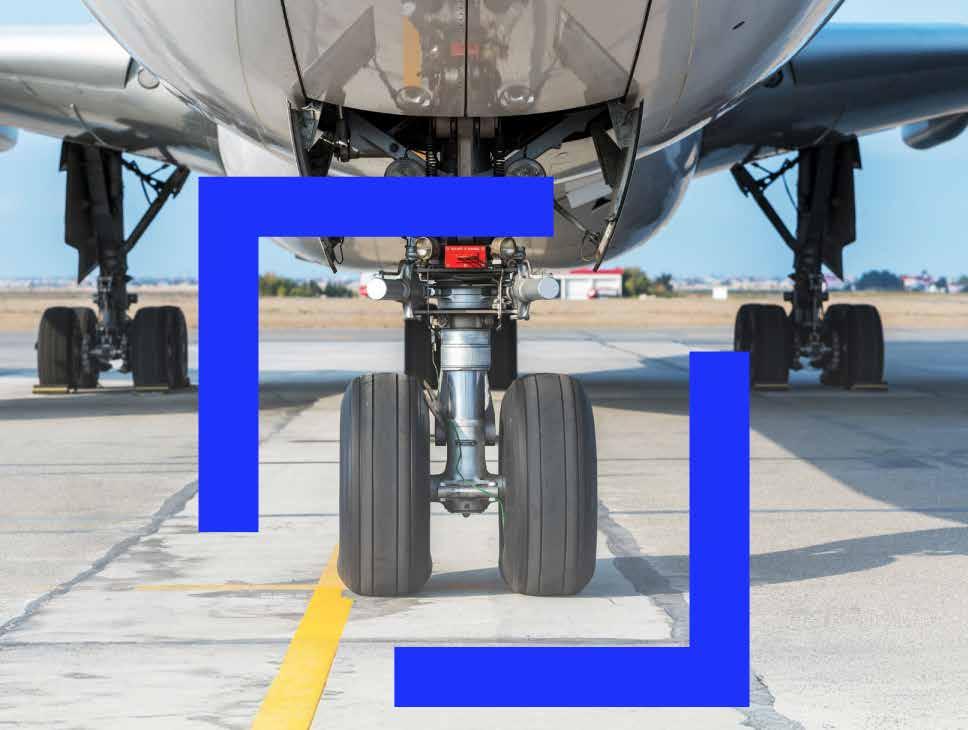
n The International Air Transport Association (IATA) in collaboration with Oliver Wyman, a global leader in management consulting and a business of Marsh McLennan (NYSE:MMC), recently launched a joint study, Reviving the Commercial Aircraft Supply Chain (link). The report addresses supply chain challenges in the aerospace industry, and explores the root cause of these challenges, the impact on airlines, and initiatives to move the aviation industry forward.
Challenges within the aerospace industry’s supply chain are delaying production of new aircraft and parts, resulting in airlines reevaluating their fleet plans and, in many cases, keeping older aircraft flying for extended amounts of time.
The slow pace of production is estimated to cost the airline industry more than $11 billion in 2025, driven by four main factors:
Excess fuel costs (~$4.2 billion): Airlines are operating older, less fuel-efficient aircraft because new aircraft deliveries are delayed, leading to higher fuel costs.
Additional maintenance costs ($3.1
billion): The global fleet is aging, and older aircraft require more frequent and expensive maintenance.
Increased engine leasing costs ($2.6 billion): Airlines need to lease more engines since engines spend longer on the ground during maintenance. Aircraft lease rates have also risen by 20–30% since 2019.
Surplus inventory holding costs ($1.4 billion): Airlines are stocking more spare parts to mitigate unpredictable supply chain disruptions, increasing inventory costs.
In addition to the mounting costs, supply chain challenges inhibit airlines from deploying sufficient aircraft to meet growing passenger demand. In 2024, passenger demand rose 10.4%, exceeding the capacity expansion of 8.7% and pushing load factors to a record 83.5%. The trend in rising passenger demand continues into 2025.
The current aerospace industry economic model, disruptions from geopolitical instability, raw material shortages and tight labour markets all contribute to the origin of the matter. With
these underlying causes considered, the report outlines key initiatives for original equipment manufacturers (OEMs), lessors, and suppliers supported by airlines to confront the supply-demand imbalance and build greater resilience.
“Airlines depend on a reliable supply chain to operate and grow their fleets efficiently. Now we have unprecedented waits for aircraft, engines and parts and unpredictable delivery schedules. Together these have sent costs spiralling by at least $11 billion for this year and limited the ability of airlines to meet consumer demand. There is no simple solution to resolving this problem, but there are several actions that could provide some relief. To start, opening the aftermarket would help by giving airlines greater choice and access to parts and services. In parallel, greater transparency on the state of the supply chain would give airlines the data they need to plan around blockages while helping OEMs to ease underlying bottlenecks,” said Willie Walsh, IATA’s Director General.
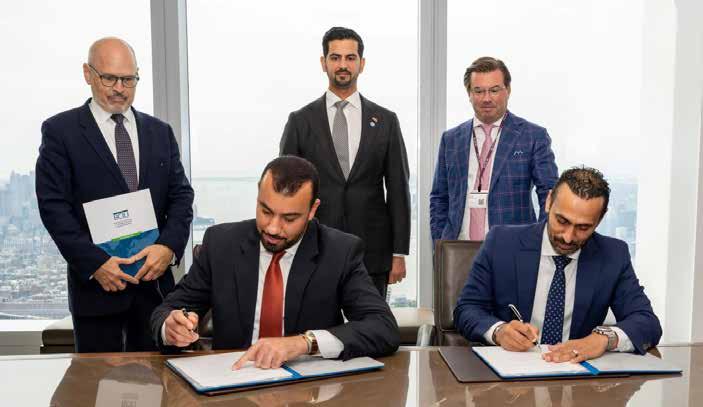
• The agreement marks a significant milestone in enhancing the role of family businesses within strategic sectors
• A state-of-the-art manufacturing centre for electric trucks to be established in Abu Dhabi
n Al Sayegh Group has announced the signing of a strategic agreement with Triton EV, a leading manufacturer of electric and hydrogen vehicles, to establish a state-of-the-art manufacturing centre for electric trucks in Abu Dhabi.
This new centre is poised to become a regional hub, catering to the growing demands of the GCC and African markets, and further strengthening Abu Dhabi’s position as a global industrial powerhouse in the future industries sector.
The agreement, formalised on the sidelines of the Abu Dhabi economic delegation visit to the US, marks a significant milestone in bolstering the role of national and family businesses within strategic, value-added sectors, while expanding avenues of cooperation with international partners. It underlines a shared commitment to embracing the global transition towards sustainable transportation solutions and advancing the path to long-term economic sustainability.
This agreement underscores the strategic role of the Abu Dhabi Chamber of Commerce and Industry as a leading platform for empowering the private sector and elevating its global presence. It forms part of the Chamber’s commitment to the 2025–2028 Roadmap, which prioritises support for family-owned businesses and small and medium-sized enterprises (SMEs), while opening new avenues for international economic partnerships.
The Chamber played a crucial role in supporting this agreement by fostering effective communication channels between the local business community and international counterparts, and by providing platforms for dialogue and cooperation that have built bridges of trust and established innovative partnerships.
Al Sayegh Group has affirmed that its new project will play a significant role in adopting the latest electric vehicle manufacturing technologies, facilitating
the transfer of global knowledge and expertise to Abu Dhabi. This initiative is fully aligned with the Group’s vision to foster industrial innovation and strengthen its investments in future-oriented sectors.
Mansour Al Sayegh, Chief Executive Officer of Al Sayegh Group, said: “The signing of this agreement is a testament to our unwavering commitment to reinforcing Abu Dhabi’s status as a global industrial hub for electric vehicles. It also highlights the pivotal role of the Abu Dhabi Chamber of Commerce and Industry, which has been instrumental in supporting these partnerships and establishing channels of communication with leading international companies, thereby paving the way for this strategic advancement. We are confident that this agreement will create new opportunities for both family-owned and national enterprises, enabling them to contribute more effectively to innovation and sustainable economic development.”
n IAG Cargo, the cargo division of International Airlines Group (IAG), has expanded its service offering by announcing that it has approved SkyCell’s temperature-controlled 1500X series containers for use on its network.
This marks another milestone for IAG Cargo’s Constant Climate cold chain service, providing pharmaceutical customers with enhanced options for highly advanced and sustainable packaging to utilise that ensures the integrity of temperature-sensitive shipments such as vaccines and biologics.
The robust SkyCell 1500X series offers up to 270 hours of independent runtime, which
can be further extended when placed in a cold room or reefers truck, ensuring cold chain protection even in the face of extreme weather or unexpected delays.
Jordan Kohlbeck, Head of Pharmaceutical at IAG Cargo, commented: “IAG Cargo’s approval of SkyCell containers was achieved through extensive collaboration and cross-functional teamwork within our organisation.
“The pharmaceutical industry demands innovative, sustainable solutions they can rely on, and that’s exactly what we are focused on. The addition of SkyCell enables us to offer customers access to a full suite
of approved temperature-controlled packaging solutions that meet the highest of standards.”
The SkyCell 1500X series is not only highly reliable, but also an environmentally sustainable option. With a low volumetric weight, CO2 emissions are reduced by up to 50% with every shipment, and its design focused on reusability and repairability, further minimises environmental impact.
IAG Cargo offers capacity to six continents, facilitating a seamless cargo journey to any part of the world via its four hubs located in London, Madrid, Dublin and Barcelona.
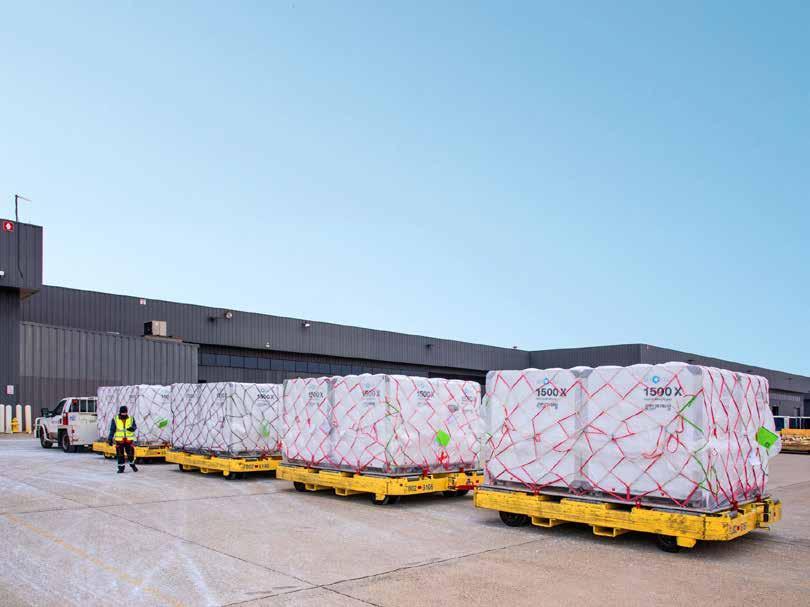
IAG Cargo has approved SkyCell’s temperaturecontrolled 1500X series containers for use on its network. The containers feature self-charging capabilities in coldchain environments and offer sustainability benefits, reducing CO2 emissions by up to 50 per cent
Our SynQ software delivers data-driven intelligence that empowers your business by synchronizing the performance of your people, processes and machines. The result is a level of efficiency and performance you never thought possible.
swisslog.com

• B2B event on December 16 and 17 in Riyadh
• 10,000+ global attendees expected at the Forum
• 300+ exhibitors from 100+ countries to participate
• 1,000+ buyers to come from KSA/ Middle East
• 5,000+ pre-scheduled meetings during the Forum
• 100+ international speakers at two co-located events
• Focus on digitalisation and connectivity
• 475 aircraft ordered by four Saudi carriers
n As Saudi Arabia works on ways of tripling its aviation capacity by 2030 when it will host the World Expo, the Global Airports Forum (GAF) has doubled its exhibition space and expanded the features-rich 4th edition to be held on December 16 to 17 at the Riyadh International Convention and Exhibition Centre (RICEC).
Organised by Niche Ideas with Matarat Holding, an arm of the General Authority of Civil Aviation (GACA), as the main sponsor, the largest dedicated airport B2B platform in the Kingdom will feature 300+ exhibitors from 100+ countries, along with 10,000+ participants.
An unprecedented 1,000+ buyers will be coming from within Saudi Arabia and the larger Middle East region. There will be 5,000+ pre-scheduled meetings during the Forum’s duration. Also, 100+ international speakers are coming for the two co-located events – Global Aviation Issues Conference and Women in Aviation General Assembly.
The 3rd edition of Airport Excellence Awards will also take place, celebrating the outstanding achievements in the aviation industry.
From 2025, Saudi Arabia will host the firstever Olympic Esports Games as part of a 12-year deal with the International Olympic Committee (IOC). The Kingdom is working to reach its ambitious target of hosting 150 million visits per year by 2030.
Saudi Arabia, which has 29 airports, is
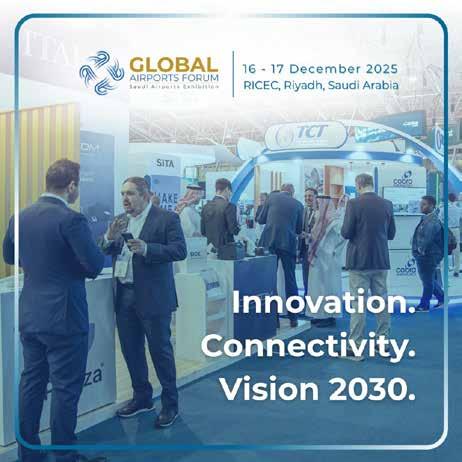
seeing selective expansions and upgrades. In 2024, the Kingdom inducted 60+ new international routes and lured in 12 overseas airlines either to start or substantially grow operations.
The Kingdom’s total airport passenger capacity stood at 126 million in 2024, with major airports like King Abdulaziz International Airport (Jeddah) and King Khalid International Airport (Riyadh) operating at 98 percent and 96 percent of their designed capacities, respectively.
In 2024, an all-time record-breaking 94 million passengers were handled by airports, a 15 percent year-on-year increase, alongside a 10 percent rise in flight activity, and a 52 percent boost in air cargo, to reach nearly one million tonnes.
In H1 2025, its airports handled over 66 million passengers and 463,800 flights, a seven percent and four percent increase, respectively. Daksha Patel, Event Director at Niche Ideas, said: “The fourth most populous country in the Arab world wants to be one of the top seven most-visited
countries by 2030. About 78.7 percent of the total value of the MENA airport construction projects are in pre-execution and execution phases. Saudi Arabia holds the largest share of the pipeline value at 42.5 percent. The Middle East aviation market is expected to reach US$33.70 billion in size by 2029.”
The Kingdom has plans to spend US$100 billion in its aviation sector, including more than US$50 billion for developing airports to become a global aviation hub connecting 250 destinations worldwide and attracting 330 million annual passengers and 4.5 million tons of cargo handling by 2030.
Selim Bouri, President Middle-East, Africa and Türkiye at SITA, said: “Airports across the region are scaling up at unprecedented speed to meet ambitious growth targets, while navigating complex challenges around capacity, passenger experience, and sustainability.
Majd Zahabi, Manager for Governance & Communications at METCO, said:“ METCO’s participation reflects its commitment to innovation
and sustainability. We have been enabling integrated airport ecosystems that enhance security, efficiency, passenger experience, and support the growth of aviation infrastructure in line with Vision 2030.”
Samana Special Mission’s Marketing and PR Manager, Rashed Albihery, said: “Since 2010, we have helped shape the region’s aviation landscape by delivering precision flight inspection and LiDAR-enabled drone surveying, with a proven track record across diverse operational environments from conflict zones to cross-border airspace. Global Airports Forum 2025 will help further advance smarter, safer, and future-ready airports aligned with Vision 2030.”
Key airport developments in the Kingdom include Jeddah airport, which is being expanded with an investment of US$31
billion to handle 114 million passengers per year. It is expected to be completed by 2031. It is targeting 170 destinations with 76 airlines, and a non-aeronautical revenue target of 45 percent of total income by 2030.
Riyadh airport is targeting 185 million annual passengers and 3.5 million tons of cargo. The Red Sea International Airport is projected to accommodate one million passengers annually upon full completion in 2030. A new Hajj and Umrah terminal in Jeddah will handle 15 million passengers a year by 2025.
Madinah airport expansion includes the construction of a new domestic terminal and the expansion of the international terminal. Al Ula International Airport is also undergoing expansion to accommodate
a projected two million visitors by 2035. Abha and Taif airports are being privatised, with investments aimed at increasing their capacity.
Earlier in 2025, Saudi Arabia reported a massive airport expansion and modernisation program with US$147 billion in investments. National carrier Saudia has placed a historic US$19 billion order for 105 Airbus A320neo aircraft to expand its fleet, set for delivery starting in 2026.
Saudi Air Navigation Services (SANS), responsible for providing air navigation services across the Kingdom, continues to focus on enhancing security, safety, and capabilities by utilising the latest technologies in air navigation, improving flight efficiency, reducing costs, and minimising environmental impact.
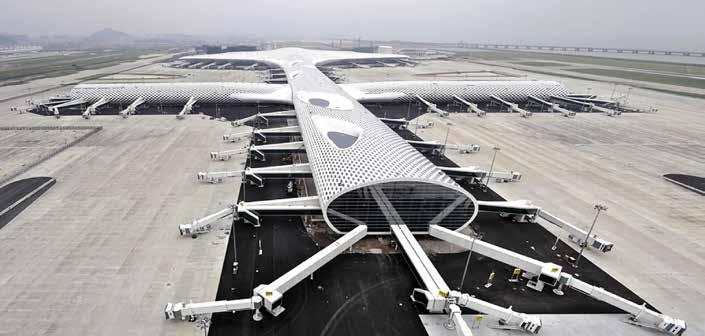
n Economic and cultural ties between Qatar and China received a boost as Hamad International Airport (DOH) and Shenzhen Bao’an International Airport (SZX) signed a Sister Airport agreement.
The agreement was officially finalised at Routes World 2025 in Hong Kong on September 27, 2025, with both airports committing to expanding passenger and cargo connectivity between the Middle East and China.
The partnership aims to enhance aviation services between Doha and Shenzhen, two cities known for their innovation-driven
economies. Qatar and China, through this collaboration, seek to leverage aviation as a tool to foster trade, technological exchange, and cultural engagement, further solidifying their growing bilateral relationship.
From January to August 2024, Hamad International Airport recorded 1.1 million passengers traveling to and from China. Shenzhen alone accounted for over 2% of the total traffic, reflecting the growing demand for travel between the Middle East and this dynamic Chinese city. This trend highlights the increasing importance of direct air links between Qatar and China,
as well as the expanding economic and cultural ties between the two countries.
Hamad International Airport currently serves as a vital hub connecting Doha to several major Chinese cities. These cities include Beijing, Shanghai, Guangzhou, Shenzhen, Chongqing, Hangzhou, Xiamen, Chengdu, and Hong Kong, which are key economic and cultural centers in China. Through Hamad International, these cities are linked to over 120 global destinations, providing a seamless travel experience for passengers heading to and from various parts of the world.
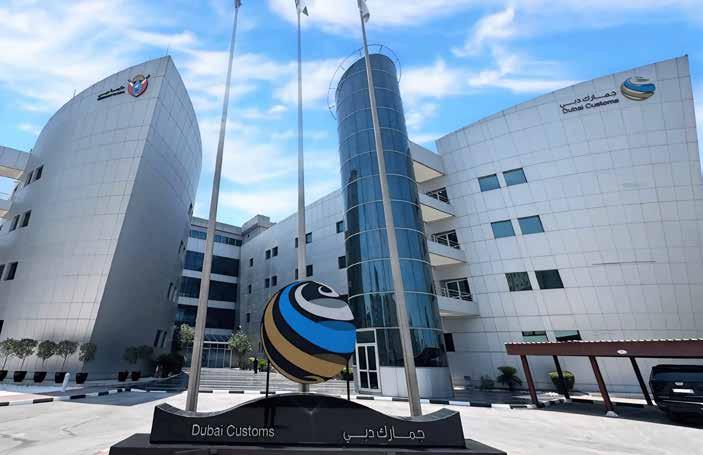
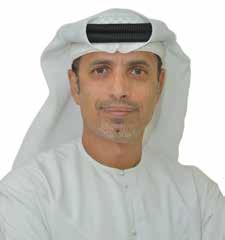
n In a pioneering move that strengthens the institutional digital transformation journey in Dubai, Dubai Customs announced the launch of its comprehensive 2030 artificial intelligence (AI) strategy. The strategy aims to integrate AI technologies across all levels of customs work and transform systems and services into a fully digital ecosystem that enhances performance and delivers a proactive and efficient experience for stakeholders, moving toward leadership in smart customs operations based on advanced technologies.
Juma Al Ghaith, Executive Director of Artificial Intelligence at Dubai Customs, confirmed that the 2030 strategy represents a fundamental pillar in setting new standards of leadership and excellence in the quality of customs and government services. He said: “We are not simply introducing AI into our systems; we are re-engineering the systems to be AIdriven. This plan represents a strategic transformation toward a fully integrated digital model based on AI technologies that respond autonomously to challenges and opportunities. We have moved beyond service development and have begun redefining the entire way we work. We have an ambitious vision aligned with the Dubai AI Strategy. Today, we are working with a future-focused mindset and tools, reflecting Dubai’s approach to becoming the world’s smartest city.”
Dubai Customs’ 2030 AI strategy is built on five main pillars aimed at developing and enhancing customs systems and procedures, as well as achieving excellence and leadership in government services. The strategy also seeks to contribute to achieving Dubai’s economic agenda targets
by generating new economic value from digital transformation toward the new economy, accelerating trade processes, and facilitating commerce.
The new strategy’s pillars include:
• Enhanced customer experience through AI-powered solutions that provide seamless and efficient services across all service channels and programs.
• AI-enabled digital capabilities to build digital infrastructure and advanced AI capabilities that support next-generation customs operations and improve decision-making processes.
• Decision-making and risk management leveraging AI to enhance risk assessment, predictive capabilities, and strategic decision-making, thereby improving operational efficiency.
• Resource optimisation through intelligent AI-driven systems for resource management, maximizing operational efficiency and economic value across all customs departments.
• Fostering an AI innovation culture by providing an environment that encourages continuous learning, innovation, and adoption of the latest AI technologies across the entire department.
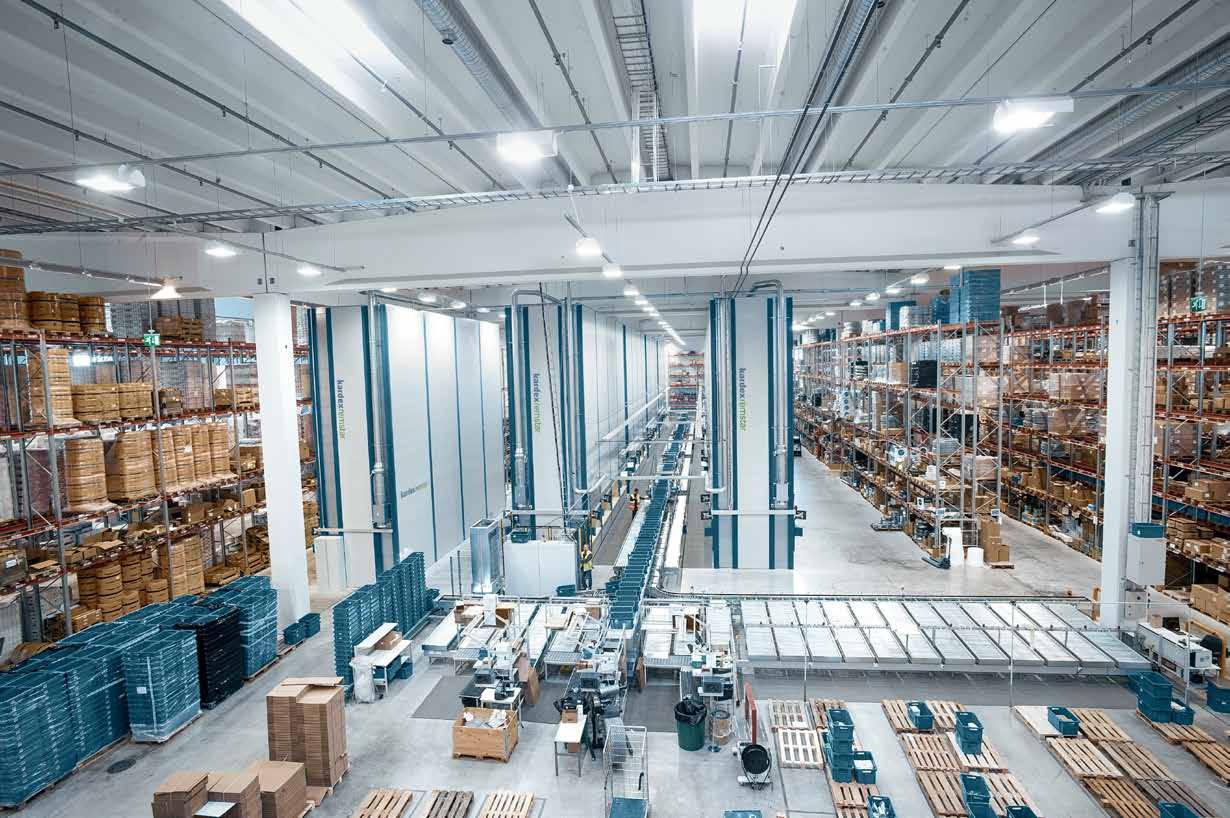

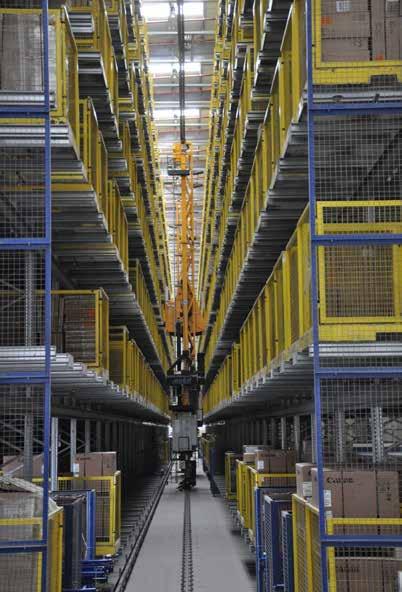
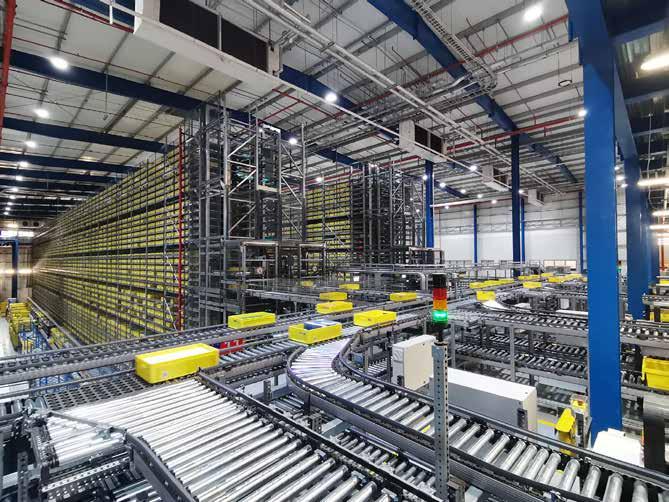

n Doha, Hamad and Ruwais ports witnessed a surge of 12 percent in transshipment volumes in September this year demonstrating that Qatar’s ports are fast becoming a hub of regional trade supported by state-of-the-art facilities.
Qatar port’s handled 124,740 twentyfoot equivalent units (TEUs) in September 2025, marking a 12 percent increase in transshipment compared to last month. RORO handling rose by approximately 34 percent compared to August 2025, while the total tonnage of general and bulk cargo exceeded 45,000 tons, state official reports.
Qatar’s maritime sector remains resilient as it handled 124,740 twenty-foot equivalent units of container through the general and bulk cargo shipments, 12,397 RORO units of vehicles, 3,881 heads of livestock and 36,879 tonnes of building materials in September 2025.
These ports serve as an effective link between markets in Asia, the Middle East, Africa, Europe, and America, contributing to reducing cargo transit time and improving the efficiency of supply chains.
Qatar’s ports also support the country’s plan to diversify the economy by facilitating export and re-export operations enhancing the ability of local industries to access foreign markets, and promoting maritime tourism.
In August of this year Qatar ports handled 126,481 TEUs marking an 8 percent growth over the previous month. The volume of
building materials, general and bulk cargo and vessel calls also rose by 38 percent, 9 percent, and 8 percent.
Hamad Port, Qatar’s main gateway to world trade keeps moving towards more powerful position as one of the key ports in the region demonstrating growth of the country’s maritime sector.
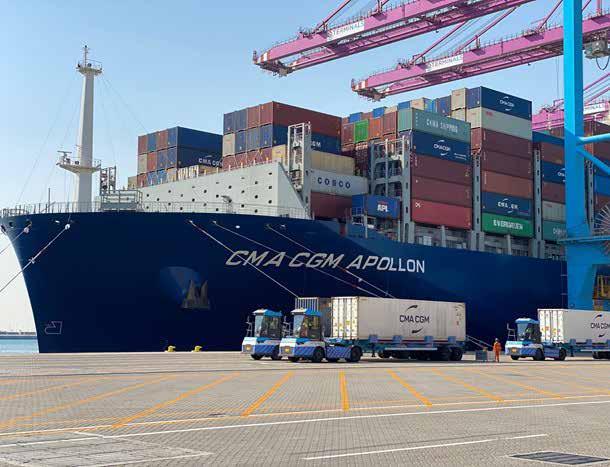
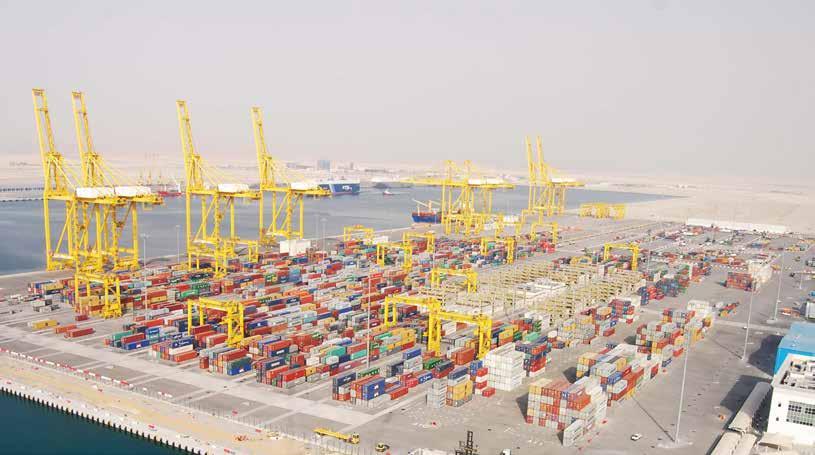
n The establishment of two new special economic zones (SEZs) – one in Ibri, Dhahirah and the other in Al Rawdhah, Buraimi – marks another significant step towards economic diversification and regional development in the sultanate.
Sheikh Faisal bin Abdullah al Rawas, Chairman of Oman Chamber of Commerce and Industry (OCCI), commended the Royal Decrees, describing the move as a “strategic milestone” that supports Vision 2040 objectives of economic diversification and private-sector leadership.
He said the establishment of these two zones would stimulate domestic and foreign investment, backed by the incentives, facilities and advantages outlined under the Special Economic Zones and Free Zones Law.
“Both zones will be equipped with integrated infrastructure and modern facilities aligned with international best practices,” he said, adding that the aim is to encourage industrial, commercial and service-based projects that support national development.
The Special Economic Zone in Dhahirah will serve as a strategic link between Oman and neighbouring Gulf states, especially Saudi Arabia, given its proximity – only 20km from the Rub al Khali border crossing and about 105km from Ibri Industrial City. This zone is expected to become a hub for manufacturing, food processing and logistics, helping to strengthen Oman’s role in regional supply chains and cross-border trade.
The Special Economic Zone in Al Rawdhah will act as a gateway for economic cooperation with the United Arab Emirates, thanks to its location along the main route connecting Sohar Port and Jebel Ali Port in Dubai. The site lies approximately 85km from Buraimi and 125km from Suhar.
According to Dheeb, the Al Rawdhah zone will help diversify investments in trade, logistics, education, health and tourism, while improving local services and infrastructure in Buraimi governorate.
“These new economic zones will enhance Oman’s regional and international competitiveness and contribute to creating new jobs and business opportunities for citizens,” Dheeb said.
n Deloitte has announced the expansion of its cutting-edge Silicon to Service (S2S) AI offering, powered by Dell Technologies and NVIDIA, to the Middle East. This move follows the recent global launch of the S2S platform, which is designed to accelerate AI adoption across various industries and empower AI sovereignty.
The S2S service offering integrates Dell’s PowerEdge XE9 servers, PowerScale storage, and NVIDIA Blackwell accelerated computing platform. This advanced infrastructure enables organisations to rapidly deploy and scale AI solutions for mission-critical operations, on any infrastructure formation, including on-premise. With its introduction to the Middle East, governments and businesses across the region can now access this comprehensive AI foundation to drive innovation and operational efficiency.
The S2S offering delivers secure, scalable AI capabilities tailored to a wide range of use cases, including AI agents that can enhance human productivity, cyber risk identification, and real time analysis of large datasets in critical sectors like government, financial services, healthcare, energy, and more. By bringing this state-of-the-art capability to the Middle East, Deloitte aims to empower organisations in the region to harness the
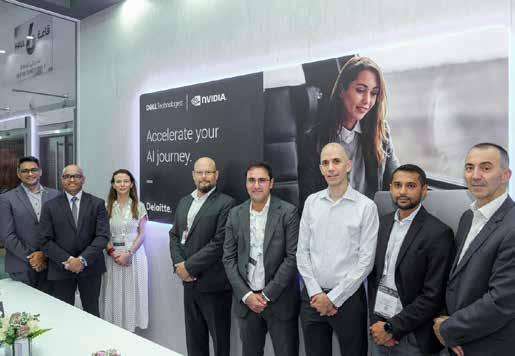
transformative potential of AI.
Commenting on this announcement on the sidelines of GITEX 2025, Yousef Barkawie, Partner in Engineering, AI & Data at Deloitte Middle East, said: “Artificial intelligence presents regional and global organisations with unprecedented opportunities to
innovate and scale. With the rollout of our Silicon-2-Service offering in the Middle East, Deloitte continues to lead AI business adoption in the region, supporting public and private organisations throughout their entire AI journey in order to unlock their full potential.”
n The latest CIPS Pulse Survey (Q3 2025) reveals that while global supply chain anxiety has eased slightly from record highs earlier this year, procurement leaders remain alert to mounting risks, including tariffs, geopolitical instability, and a sharp rise in cybersecurity threats.
The quarterly survey, conducted by the Chartered Institute of Procurement and Supply (CIPS), found both short-term and 12-month concern levels have moderated since Q2, but remain above 2024 averages. The findings highlight that despite temporary relief; global supply chains are still operating under significant pressure.
Across the Middle East, procurement and supply professionals report similar trends: a cautious improvement in sentiment but heightened vigilance over digital vulnerabilities and tariff exposure.
Ben Farrell MBE, Chief Executive Officer of CIPS, said: “Procurement and supply chain professionals report that the panic spikes of earlier this year have eased, but the fundamentals - tariffs, geopolitics, and global volatility - haven’t gone away. Leaders are now prioritizing long-term resilience, with cyber threats emerging as a risk equal to physical supply shocks. Recent highprofile breaches underscore the need for organisations to embed cybersecurity at the heart of supply chain strategy or risk severe operational and reputational consequences.”
For the first time, the CIPS Pulse Survey asked respondents about cybersecurity. Nearly one in three organisations (29%) reported an increase in cyberattacks on their supply chains over the past six months, a clear sign that digital risk has become a core boardroom issue.
Sam Achampong , Regional Director of CIPS MENA, commented: “Cyber resilience is now a fundamental part of procurement leadership. In the Middle East, where digital transformation is accelerating across industries, supply chains are becoming increasingly data-driven and interconnected. This
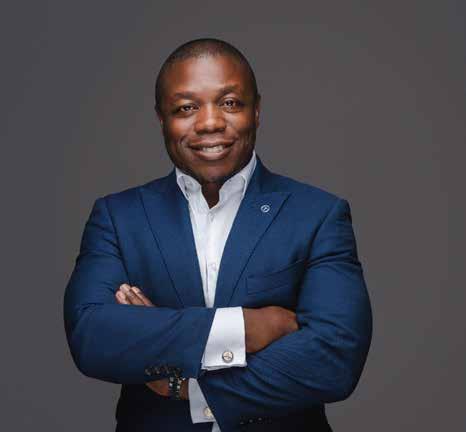
Sam Achampong , Regional Director of CIPS MENA
brings enormous opportunity but also heightened exposure. Procurement professionals must now act as the first line of defence, ensuring suppliers, partners and systems are secured from end to end.”
“Nearshoring and local content development are becoming real priorities for MENA economies. These strategies not only mitigate tariff and logistics risks but also create stronger, more self-reliant supply ecosystems that are critical for long-term economic sustainability,” he added.
• The Q3 survey data highlights several emerging trends shaping procurement strategies worldwide:
• Technology supply risk is on the rise, with 19% of respondents citing significant price increases in computers and hightech equipment.
• Petroleum and transport equipment also remain elevated at 16%.
• 59% of procurement teams are now exploring local manufacturing or nearshoring to reduce tariff exposure.
• 54% are renegotiating supplier contracts, and 41% are consolidating spend for volume leverage.
Dr. John Glen, CIPS Economist, noted: “We are seeing a structural pivot in supply chains. Tariffs are no longer a theoretical riskthey’re reshaping where and how businesses source. The fact that nearshoring and contract renegotiation are leading strategies shows how procurement is moving from firefighting to long-term redesign.”
Ben Farrell concluded: “The data tells us procurement is adapting fast. Nearshoring, contract renegotiation, and cyber defence are now everyday boardroom topics. The pressure may have eased slightly this quarter, but global supply chains remain fragile, and procurement leaders are still sounding the alarm.”
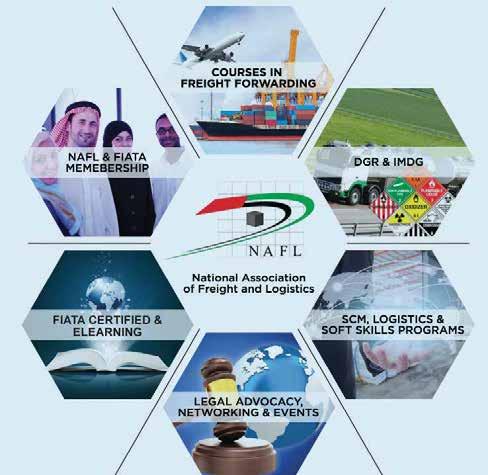

+ The FIATA member certificate
+ Use of the Fiata logo
+ Entry in the FIATA members directory & networking events

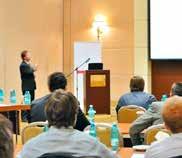


+ Advertising in the FIATA members directory, review and information (FIATA e-Flash)
+ Special Rates for FIATA publication and articles
+ Access to secretariat›s assistance
+ FIATA arbitration code
+ Use of FIATA documents
+ FIATA worldwide member connectivity
+ Talent Connect Worldwide, E-Learning

+ Discountes rates in participating in global and regional conferences
+ Asssistance in case of legal advocacy
+ Discounts for cargo/logistic events and exhibition stands
+ Discount training for NAFL members
+ Training/Certification for regional/international courses
+ Insurance at discounted rates (cargo/liability/medical)
+ Complimentary internship, Skill upgrade and Mentoring & Innovation ideas
+ Discounted supplier rates for industry products

n Universal Rubber Belt Manufacturing has recently announced the commencement of supply of its locally manufactured automotive belts to Select Auto, an AlFuttaim group company and a leading provider of maintenance services for the RTA bus fleet in Dubai.
Being based in Dubai, Universal Rubber Belt Manufacturing is proud to contribute to the growth of the UAE’s industrial sector while offering faster and more accessible supply of critical automotive components to leading service providers such as Select Auto. This local presence allows for
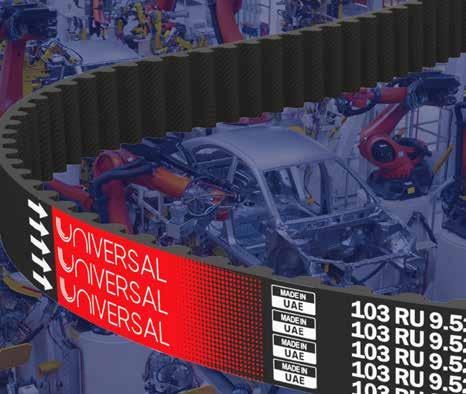
improved responsiveness, reduced lead times, and enhanced operational continuity for customers.
Sam Jalali, sales manager, Universal Rubber Belts Manufacturing, said: “We are proud to see our Dubai-made automotive belts supporting an organization of Select Auto’s calibre. This step reflects our commitment to strengthening local manufacturing, supporting the UAE economy, and delivering reliable solutions to our customers.”
Universal Rubber Belt Manufacturing continues to focus on strengthening its presence in the regional automotive sector by supplying durable, precision-engineered belts for a wide range of commercial and transport applications.
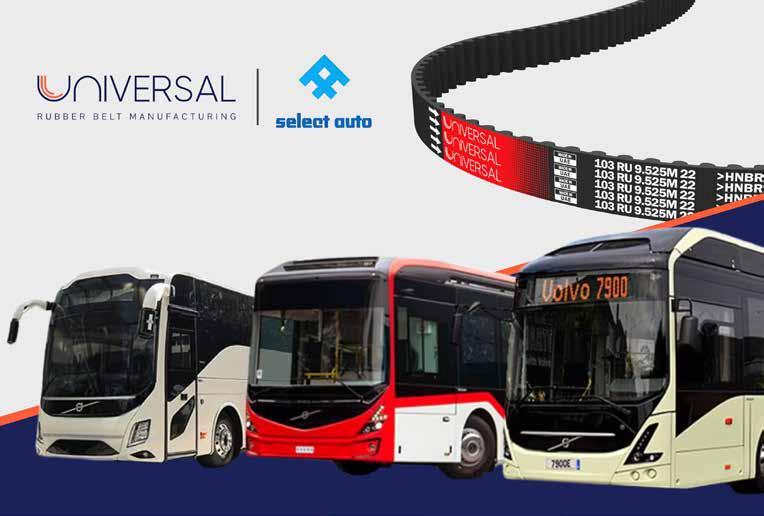


“I didn’t
Co-Founder & Group CEO at RSA Global, Abhishek Shah has not only built and guided a diverse, dynamic organisation, but also takes pride in being known as a ‘Girl Dad.’
Over the past 15 years, RSA Global has grown into a trusted logistics partner with expertise spanning end-toend supply chains, eCommerce, petrochemicals & chemicals, and cold chain management, serving fastevolving markets in the Middle East, Africa, and the Indian subcontinent. Our Editor discovers why he believes that supply chains are the lifeblood of the global economy.
Abigail Mathias: What’s your typical day like?
Abhishek Shah: A typical weekday for me starts early. I head to the gym, I’m usually in the office between 8:30 and 9 a.m., and the day unfolds depending on what’s on the agenda. Evenings are reserved for an early dinner with my kids and spending time with my wife before bed. Fairly unexciting during weekdays, but it keeps me grounded.
AM: What inspired you to get into logistics?
AS: Like many in my generation, I didn’t exactly choose logistics, logistics chose me. I graduated in 2009 when banking and consulting roles were scarce. My father entered the industrial real estate business, and together we thought of building a brand. That’s how RSA was born. It was more serendipity than strategy at the time.

What do you do to keep yourself fit?
I pride myself on balancing a healthy lifestyle. That means maintaining a good relationship with food, using wearables to track my body’s performance, and committing to regular fitness routines, strength training, padel, and staying active in general.
What time do you break for lunch?
I’m very disciplined about lunch — 1 p.m. sharp, almost every day. My body is trained for it, and I like having that routine.
Around what time do you wrap up work?
Most days I wrap up between 5:30 and 6 p.m. I try to keep that discipline so I can be home in time for dinner with my kids.
AM: How do you unwind in the evenings?
AS: Time with my kids is always the best reset. Otherwise, I’ll switch off with some light or even trash TV, something that helps me truly disconnect.
AM: When and where is your next holiday?
AS: My next holiday is a trip with my children to Lapland, something we’re all looking forward to.
AM: What advice would you give other business professionals juggling time?
AS: For me, it’s all about managing by calendar. I’m meticulous about it, if it’s not in the calendar, it doesn’t exist. Blocking time for family, exercise, and focus work allows me to balance the many priorities on my plate.
AM: When do you catch up on world and business events?
AS: LinkedIn is my go-to platform, not only for contributing but also for consuming global and business news. I also rely on news outlets I’m subscribed to, quick updates on Instagram, and for sports, which I love, I turn to dedicated sports websites I’ve followed for years.
AM: What do you hope to achieve in logistics in the next five years?
AM: To you, Global Supply Chain Magazine is… AS: A fantastic industry publication. It keeps us updated on trends and developments while connecting us to the broader logistics ecosystem.
AS: Our ambitions are clear: to expand our regional footprint across the Middle East and India across multiple businesses, e-commerce, forwarding, petrochemicals, and cold chain. The goal is to connect those regional networks to the global dots and build a stronger, more integrated logistics presence.

